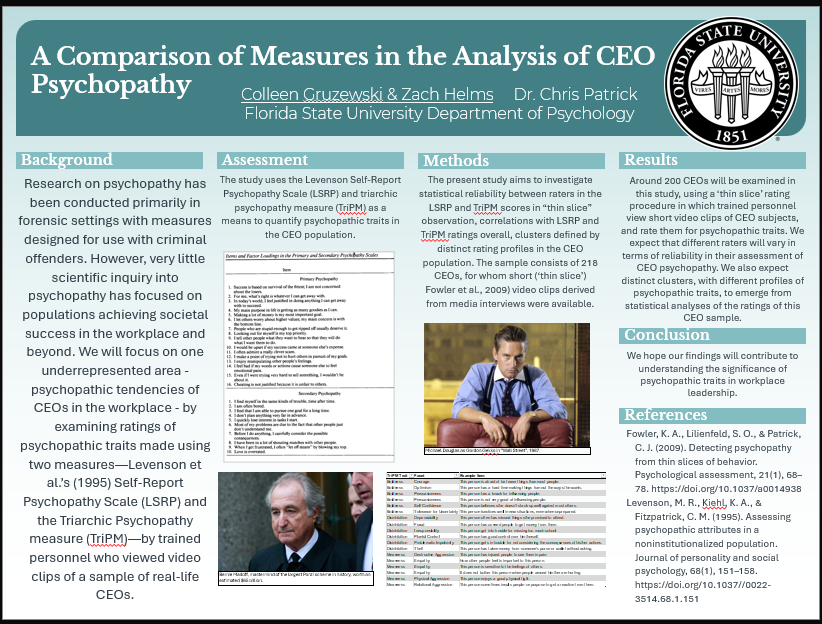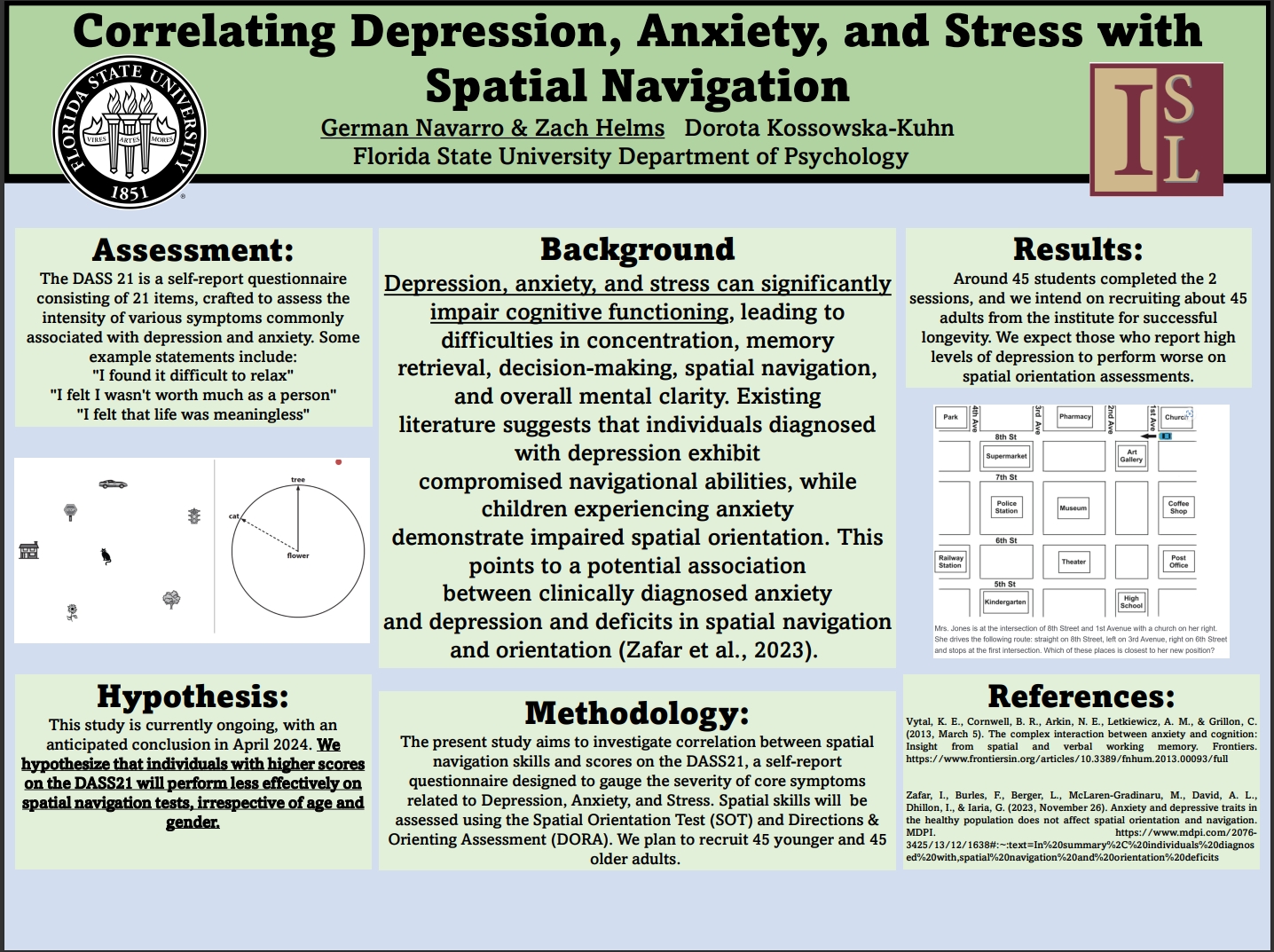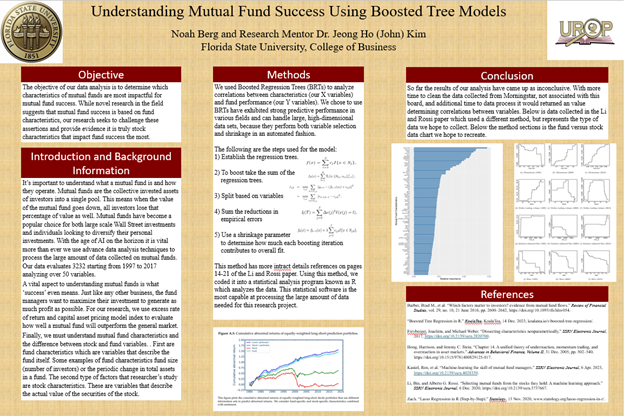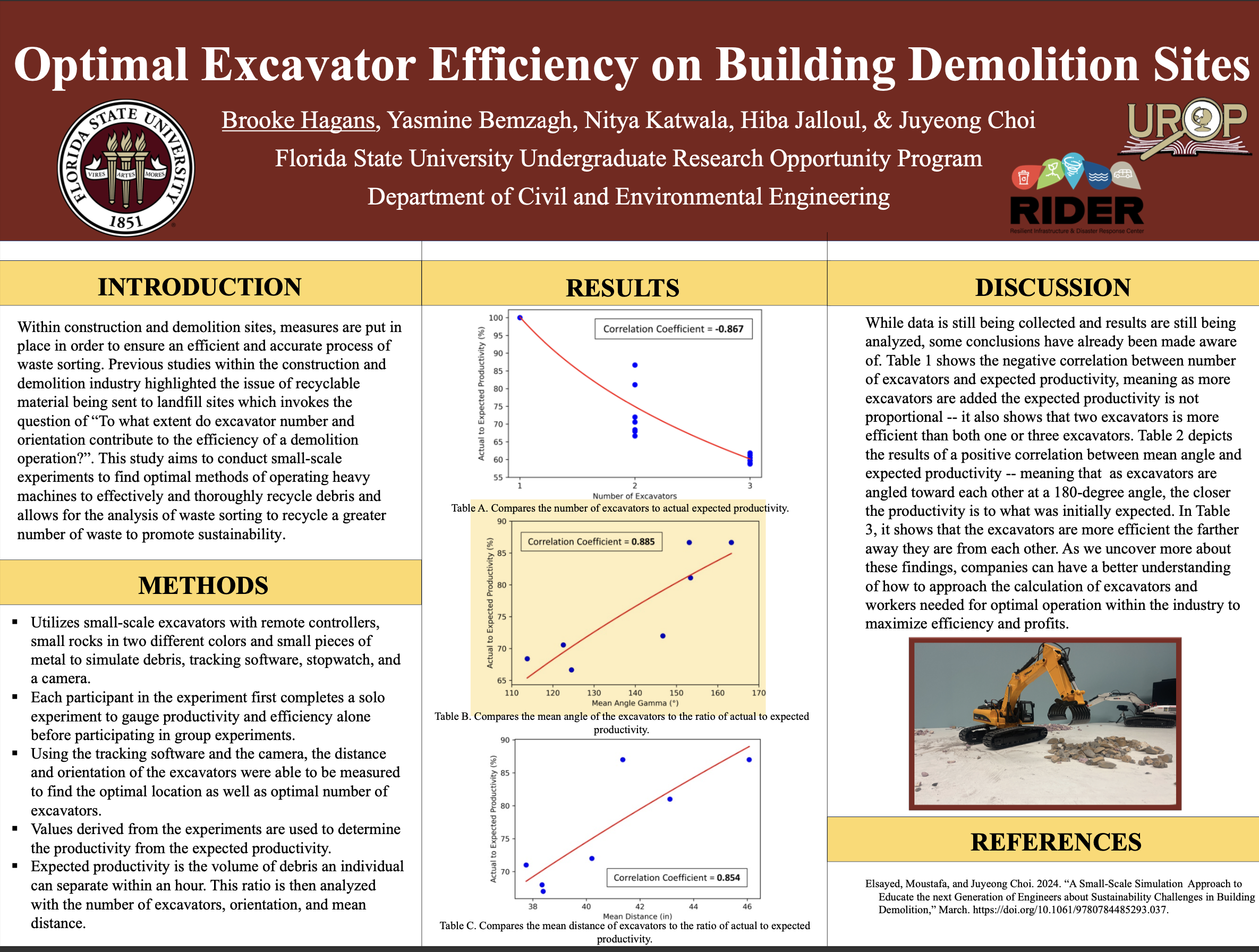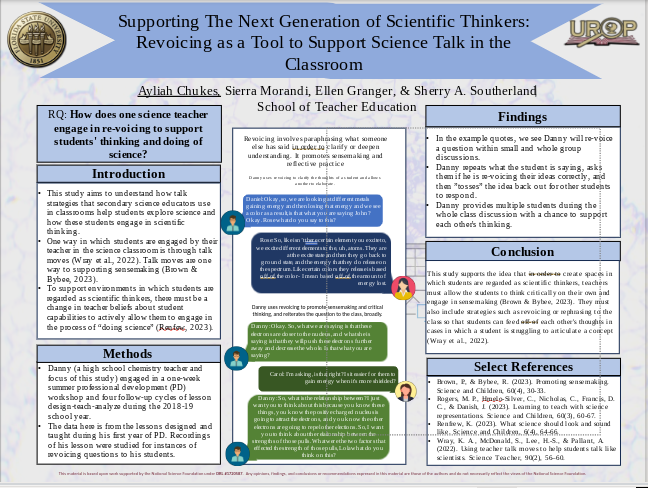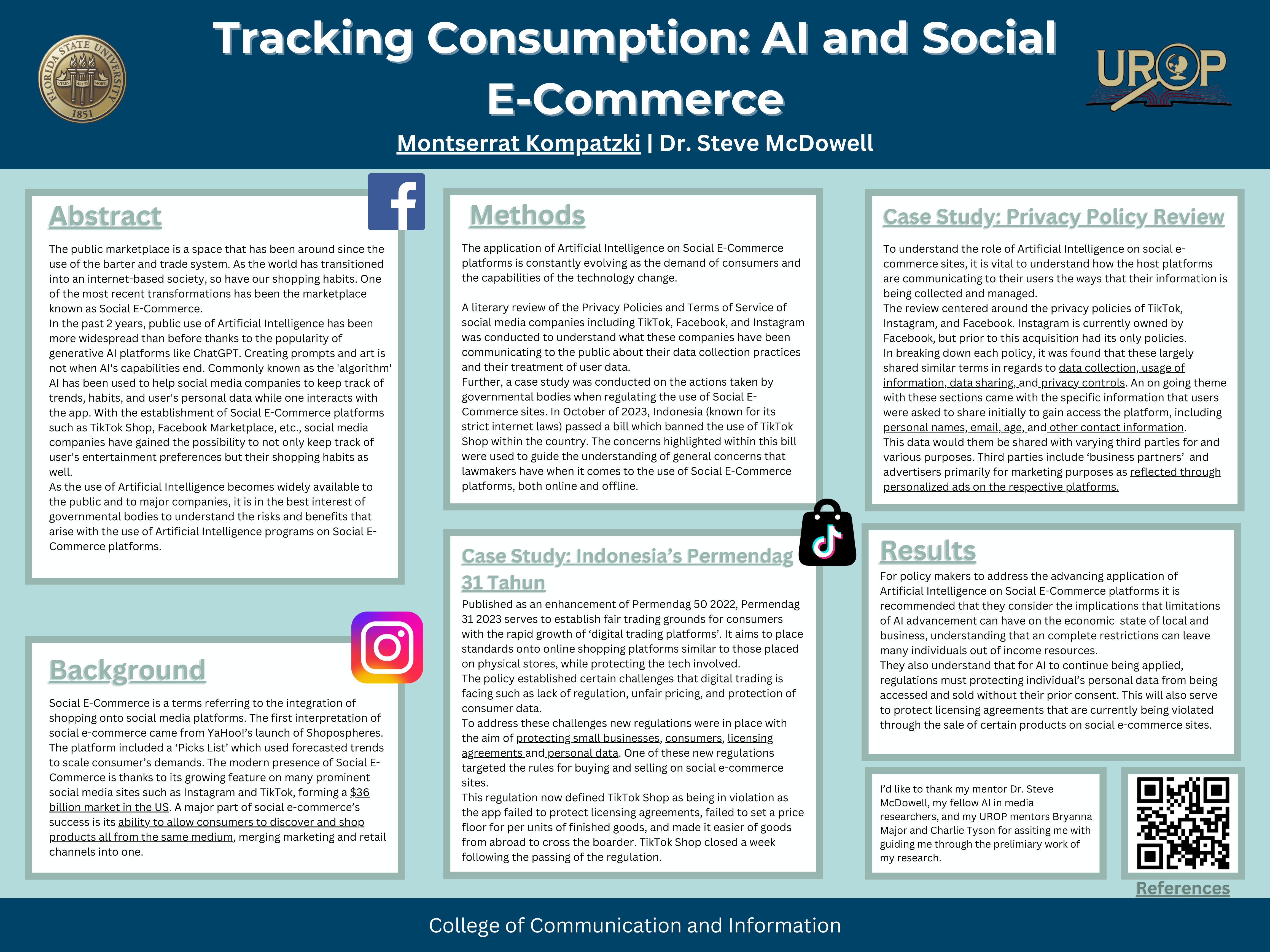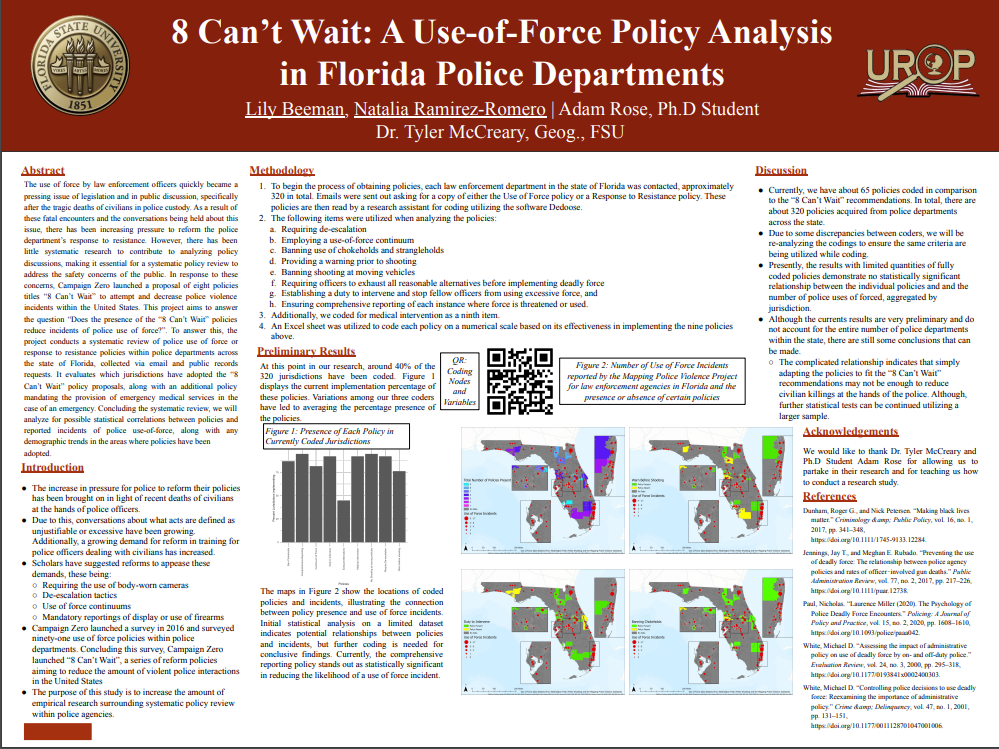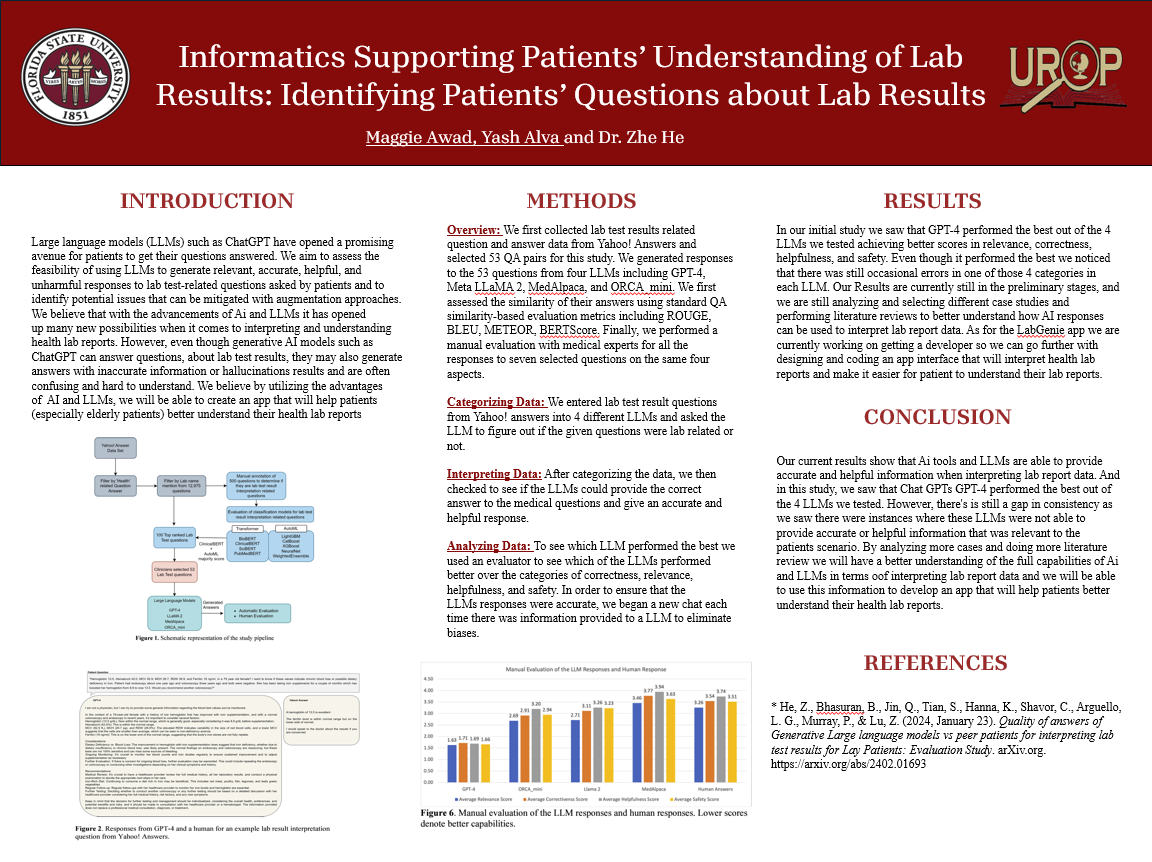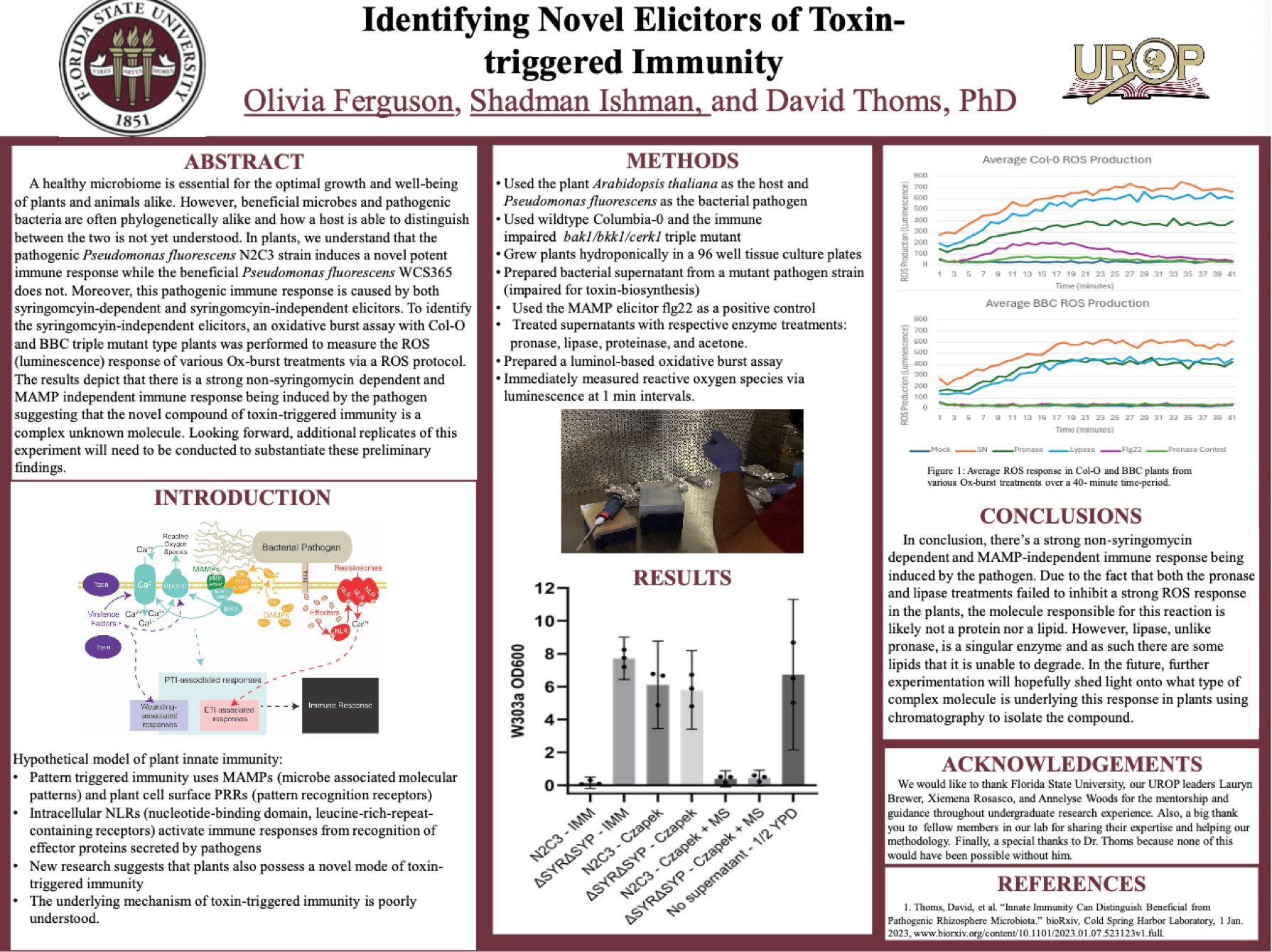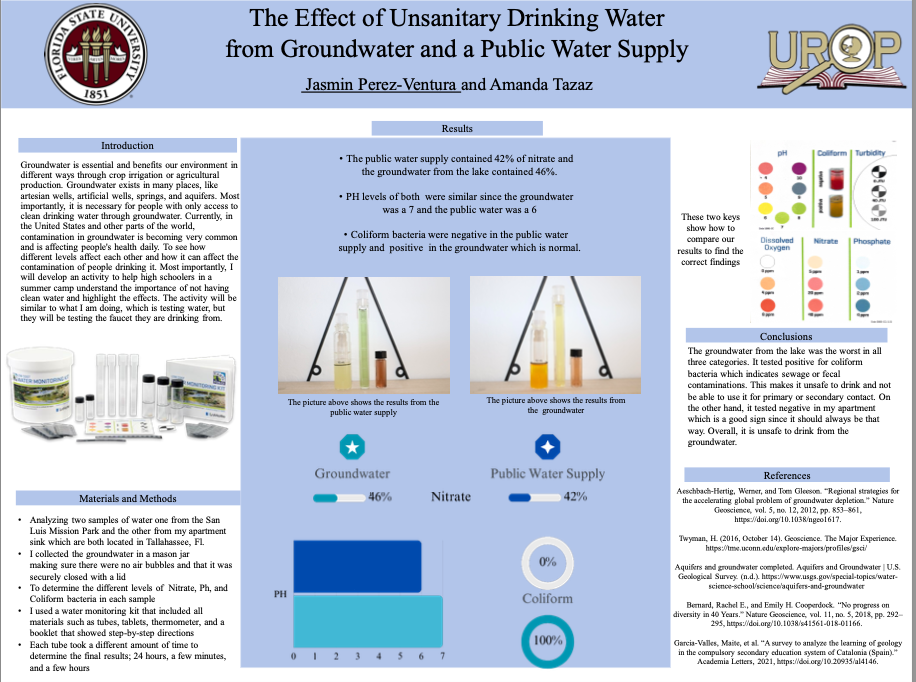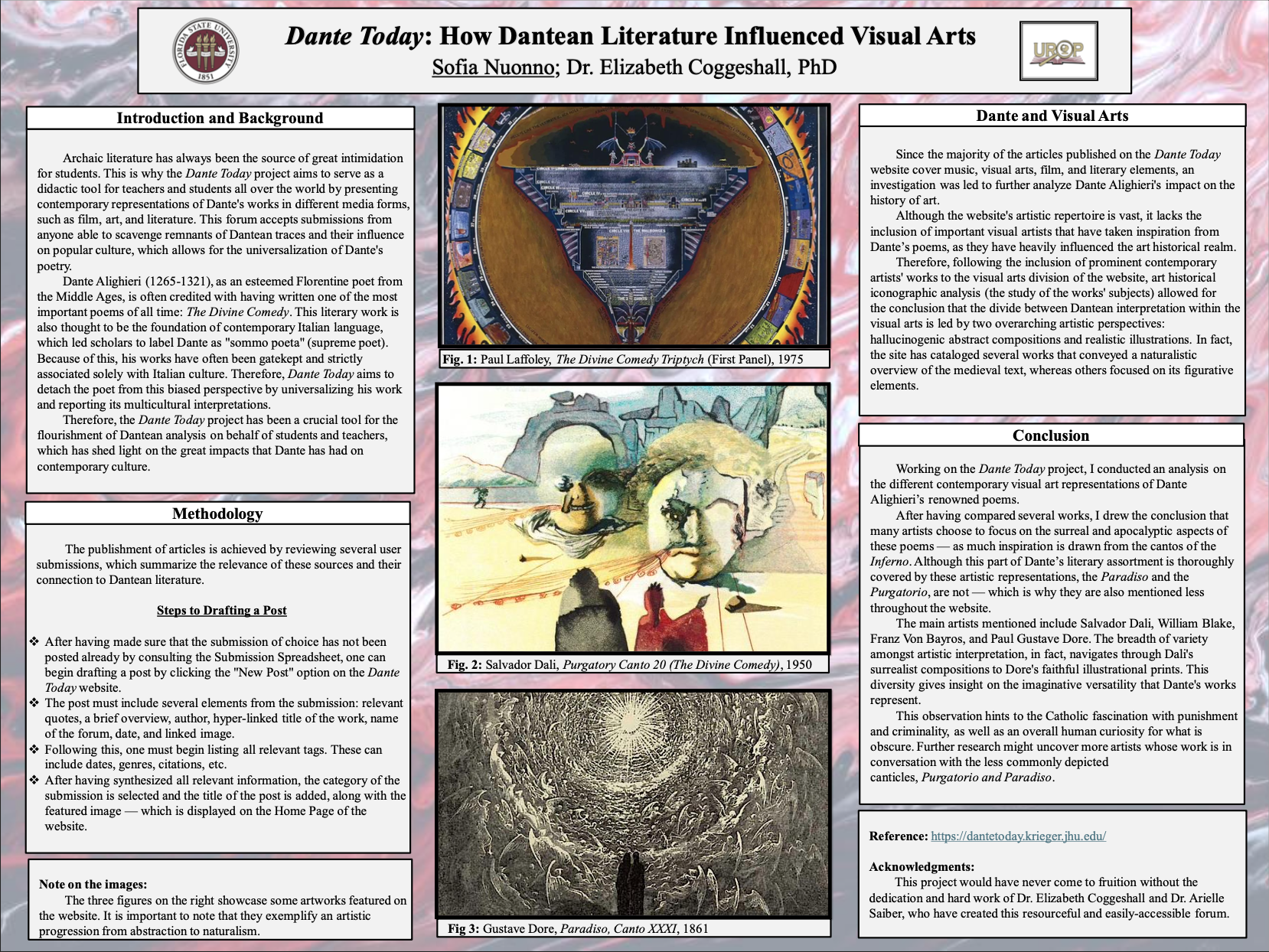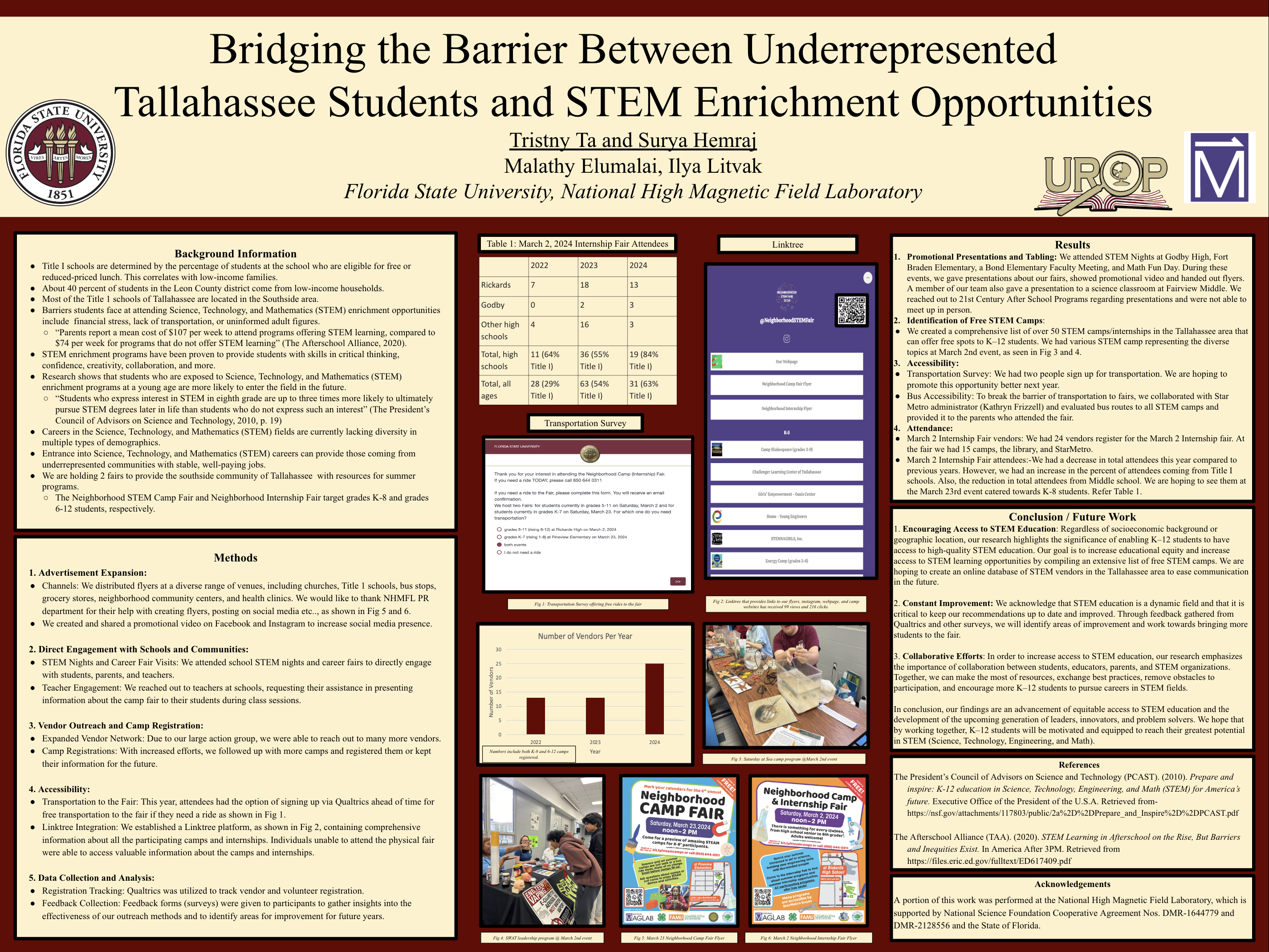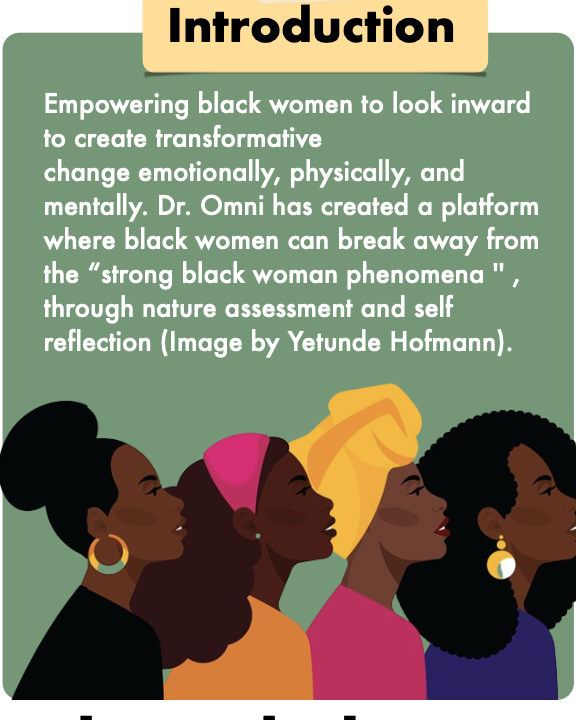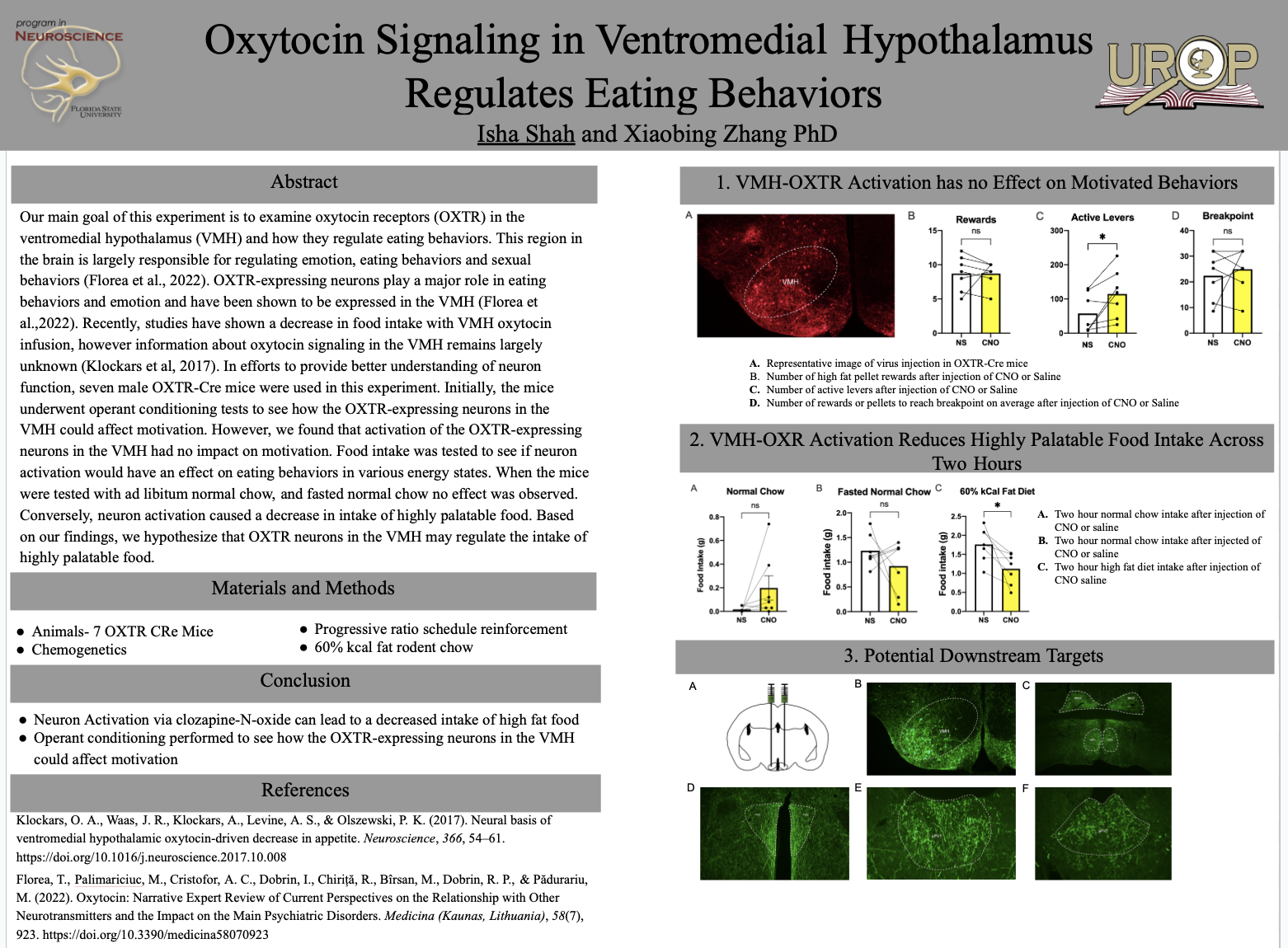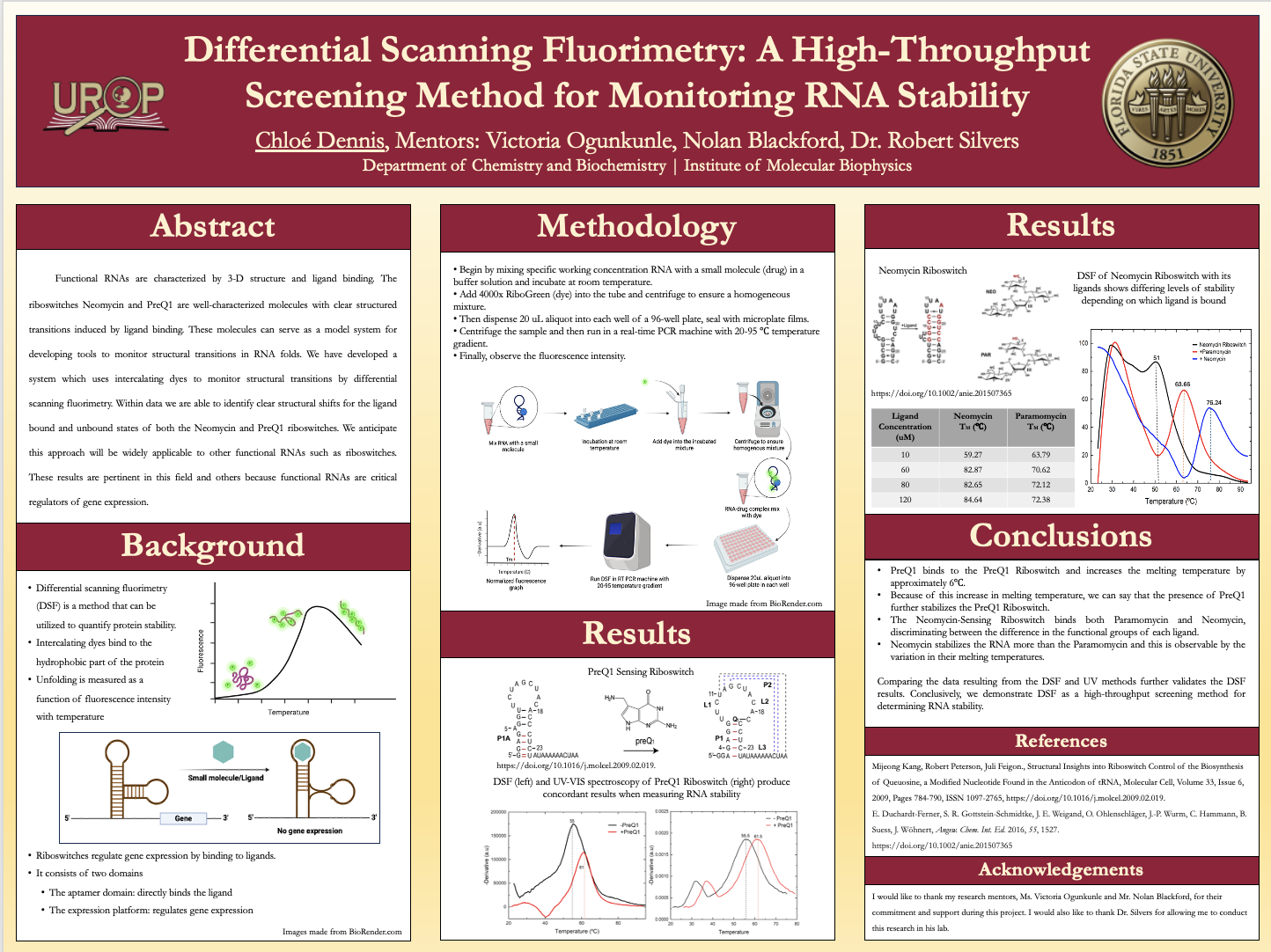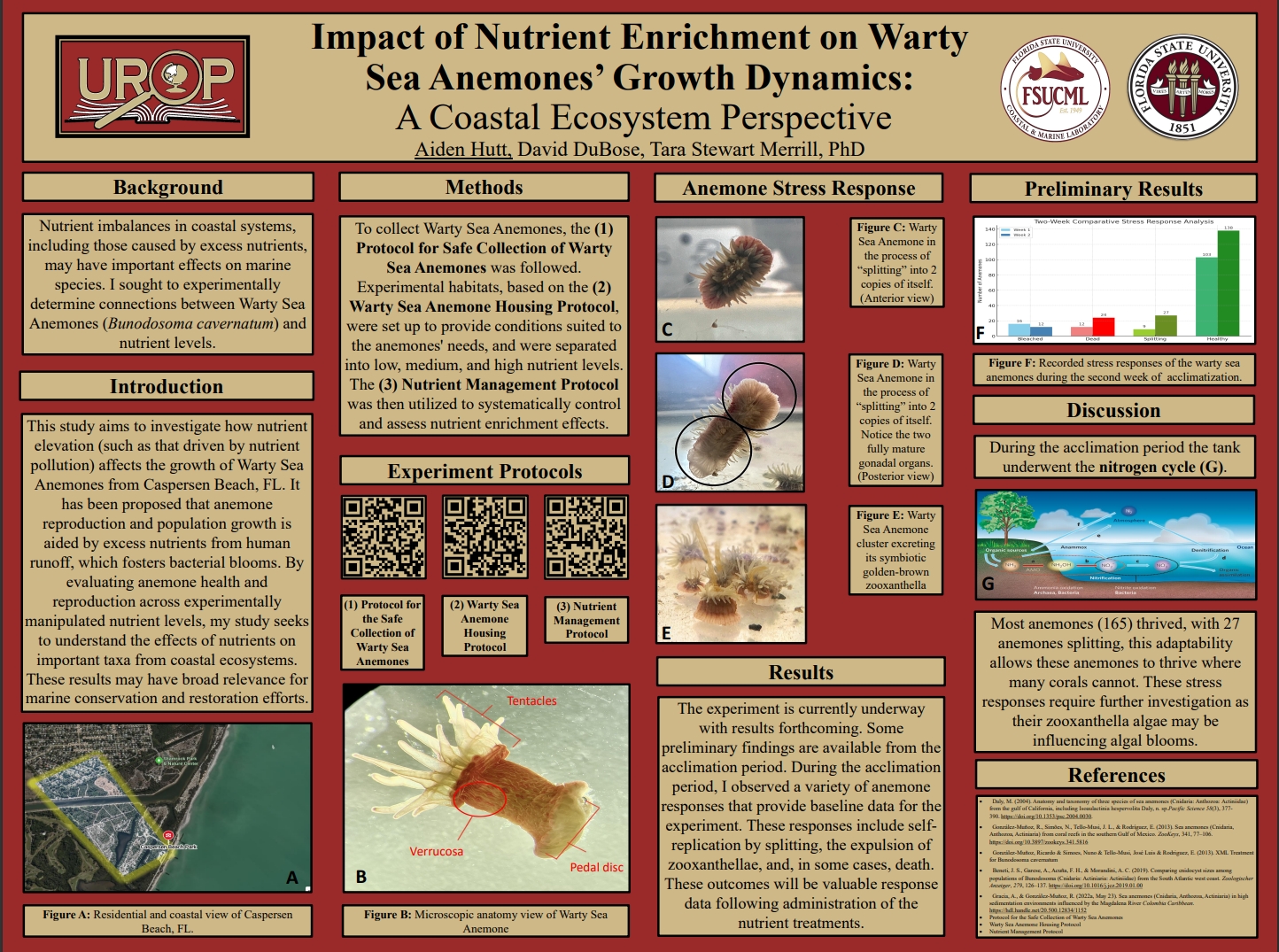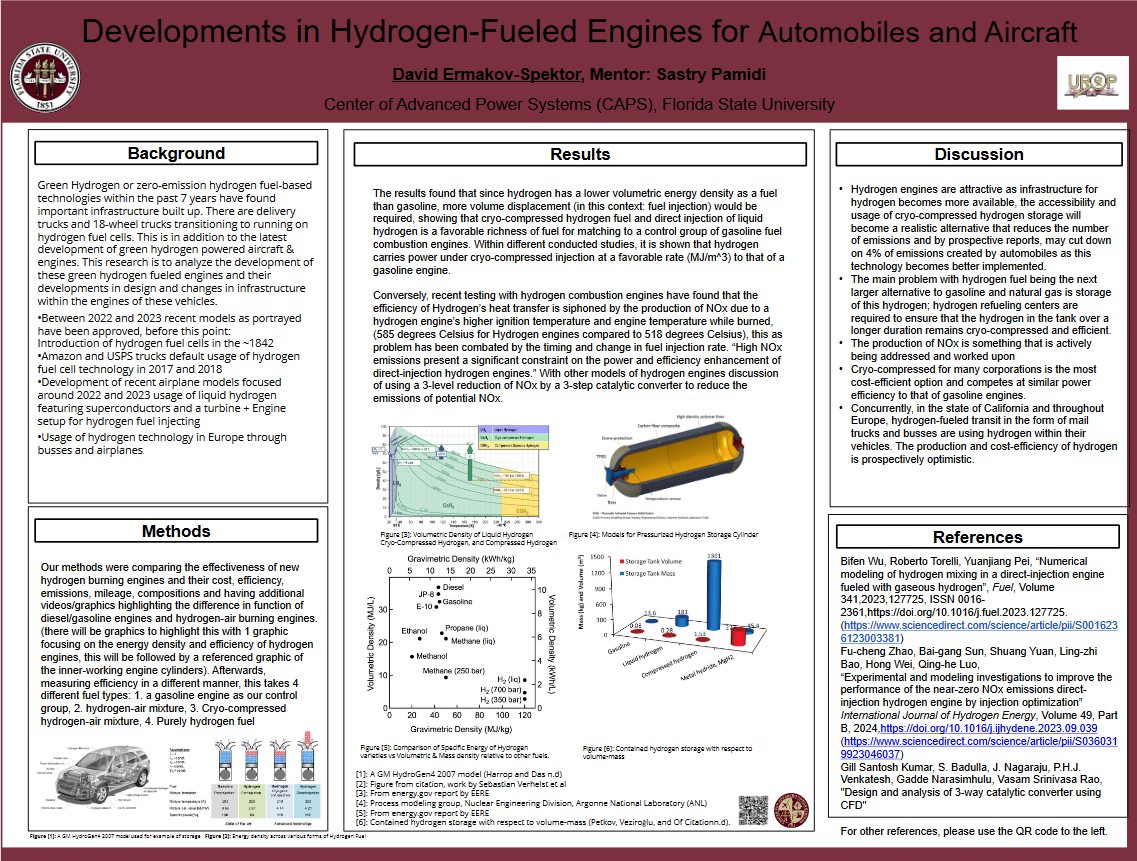Research Symposium
24th annual Undergraduate Research Symposium, April 3, 2024
Charles Price Poster Session 5: 4:00 pm - 5:00 pm/197
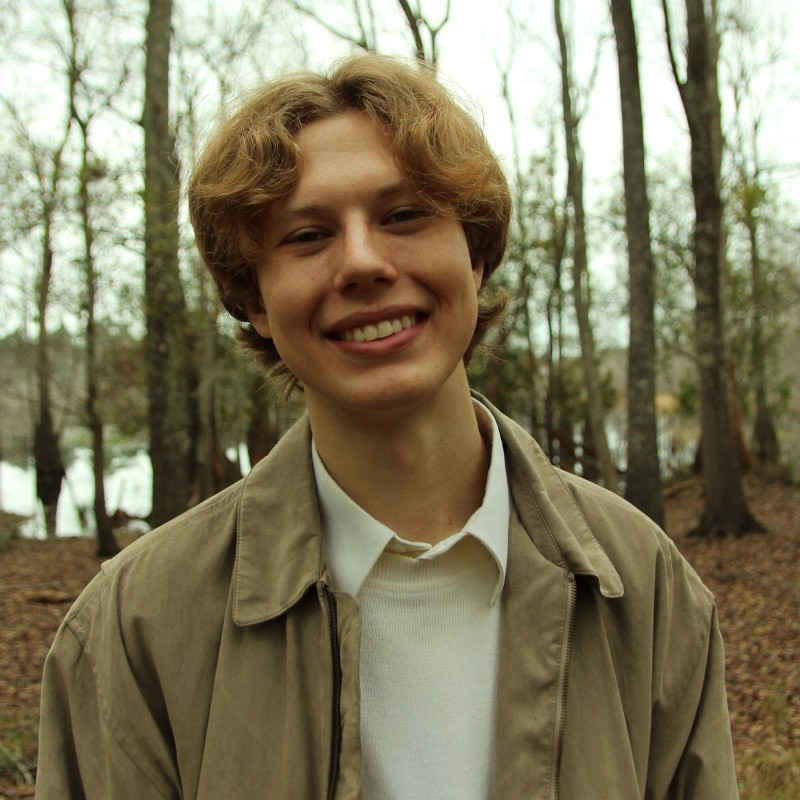
BIO
I am currently pursuing a degree in Mechanical Engineering at FSU with the hope to work in robotics. Robotics and it's versatility is fascinating to me and my interest has only been expanded by this study. It has even caused me to look into working on robotic prosthetics as a potential passion and goal for my career. I just hope to continue hands on work as research has been incredibly fulfilling to me.
The Potential Use of Kimera for Spatial Mapping to Predict Human Intent
Authors: Charles Price, Taylor HigginsStudent Major: Mechanical Engineering
Mentor: Taylor Higgins
Mentor's Department: Mechanical Engineering Mentor's College: Florida State University Co-Presenters:
Abstract
Many existing robotic lower-limb assistive devices available today are reactionary in the sense that they must first be prompted manually by the user to begin assisting with a particular action. Our research is focused on building a system that will allow the assistive device to predict the user's intent and begin helping with the action before a forced prompt, allowing for a more seamless and intuitive user experience. For example, we would like for the device to be able to recognize that a user wishes to sit down based on visual information revealing that they are approaching a chair and moving in a way consistent with sitting. To do this we first need to find the chairs using existing computer vision toolboxes such as the Simultaneous Localization and Mapping toolbox ‘Kimera’ developed and made open-source by MIT. We hypothesize that Kimera will help us towards our intent-recognition goal by spatially mapping the surrounding environment while also providing semantic labels for the objects in the scene. So far, the project has required an extensive knowledge of the Linux operating system, terminal programming, and extensive debugging. Despite the dearth of instructions for implementing Kimera, we are excited to have Kimera successfully installed and are ready to begin testing it’s capabilities this semester.
Keywords: Robotics, SLAM, Kimera, Human Intent, Mechanical Engineering
24th annual Undergraduate Research Symposium, April 3, 2024
Zach Helms Poster Session 3: 1:30 pm - 2:30 pm/75
BIO
Zach Helms is a third year Psychology and Criminology Double Major from Gulf Breeze Florida. His research interests include clinical assessment measures, antisocial behavior and its analogues, biological correlates to behavior, and forensic applications. After graduating, he aims to pursue his PhD in clinical psychology and become a practicing forensic psychologist.
A Comparison of Measures in the Analysis of CEO Psychopathy
Authors: Zach Helms, Dr. Christopher PatrickStudent Major: Psychology, Criminology
Mentor: Dr. Christopher Patrick
Mentor's Department: Department of Psychology Mentor's College: College of Arts and Sciences Co-Presenters: Colleen Gruzewski
Abstract
"Given that research on psychopathy was conducted for many years in forensic settings using measures designed for use with criminal offenders, the question arises: What do psychopathic individuals look like who are not behind bars – but instead have managed to achieve some degree of success in their occupational pursuits?” (Lowman, Bertoli & Patrick, 2018). While there evidently is a variety of research on criminal psychopathy, there appears to be a lack of understanding on how psychopathy can be applied to the workplace setting. Current research suggests that increasing interest in psychopathy in the workplace could be a valuable focus, yet there has not been adequate scientific research to characterize it effectively (Smith & Lilienfield, 2013). We will focus on one underrepresented area - psychopathic tendencies of CEOs in the workplace - through the Levenson Self-Report Psychopathy Scale (LSRP) and triarchic psychopathy measure (TriPM) ratings obtained through various statistical measures. More specifically, we are using the Levenson Self-Report Psychopathy Scale and the Psychopathic Personality. The study is currently ongoing and will be anticipated to conclude in April 2024. We hypothesize that our findings will point to a variety of psychopathy levels between CEOs, based on these scales. We hope that our findings will contribute to understanding the significance of psychopathic tendencies of leaders in the workplace.
Keywords: Psychology, Psychopathy, Ongoing
24th annual Undergraduate Research Symposium, April 3, 2024
Zach Helms Zach Helms Poster Session 1: 9:30 am - 10:30 am /253
BIO
Zach Helms is a third year Psychology and Criminology Double Major from Gulf Breeze Florida. His research interests include clinical assessment measures, antisocial behavior and its analogues, biological correlates to behavior, and forensic applications. After graduating, he aims to pursue his PhD in clinical psychology and become a practicing forensic psychologist.
Correlating Depression, Anxiety, and Stress with Spatial Navigation Skills
Authors: Zach Helms, Dorota Kossowska-KuhnStudent Major: Psychology, Criminology
Mentor: Dorota Kossowska-Kuhn
Mentor's Department: Department of Psychology Mentor's College: College of Arts and Sciences Co-Presenters: German Navarro
Abstract
Background: Depression, anxiety, and stress can significantly impair cognitive functioning, leading to difficulties in concentration, memory retrieval, decision-making, spatial navigation, and overall mental clarity. Existing literature suggests that individuals diagnosed with depression exhibit compromised navigational abilities, while children experiencing anxiety demonstrate impaired spatial orientation. This points to a potential association between clinically diagnosed anxiety and depression and deficits in spatial navigation and orientation (Zafar et al., 2023).
Methods: The present study aims to investigate correlation between spatial navigation skills and scores on the DASS21, a self-report questionnaire designed to gauge the severity of core symptoms related to Depression, Anxiety, and Stress. Spatial skills will be assessed using the Spatial Orientation Test (SOT) and Directions & ORienting Assessment (DORA). We plan to recruit 45 younger and 45 older adults.
Results: This study is currently ongoing, with an anticipated conclusion in April 2024. We hypothesize that individuals with higher scores on the DASS21 will perform less effectively on spatial navigation tests, irrespective of age and gender.
Keywords: Spatial Navigation, Anxiety, Depression, Stress
24th annual Undergraduate Research Symposium, April 3, 2024
Noah Berg Poster Session 4: 2:45 pm - 3:45 pm /361
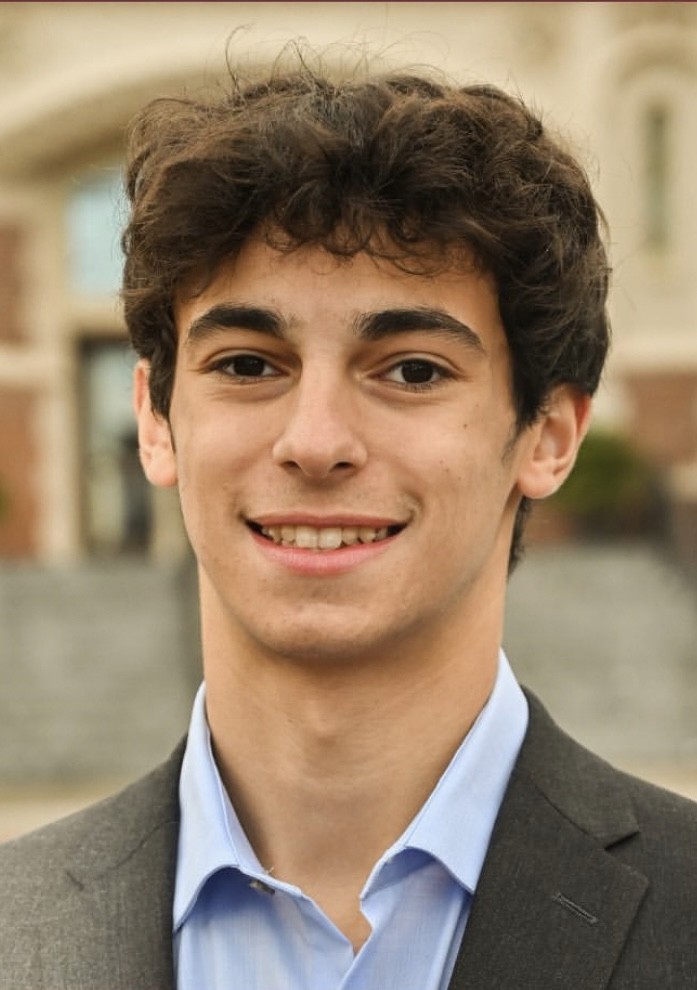
BIO
Hello, my name is Noah Berg and I'm a 2nd year student from Tampa, Florida. Although I originally went into college only wanting to study economics, I quickly found that the world of finance captivated me in a way no other discipline has. At first it started with investing whatever savings I had in simple stocks and index funds but has rapidly evolved into advanced research into different financial instruments that exist in our institutions. I'm specifically interested in research concerning mutual funds, market operations, economic forecasting, private equity, and banking. Working with Dr. Kim has been an honor and an insightful glimpse into the world of finance research. This project has truly ignited a passion for finance which I hope to harness into a productive career and a devoted effort to make the world a better place.
Understanding Mutual Fund Success Using Boosted Tree Models
Authors: Noah Berg, Dr. Jeong Ho KimStudent Major: Economics and Finance
Mentor: Dr. Jeong Ho Kim
Mentor's Department: Department of Finance Mentor's College: College of Business Co-Presenters:
Abstract
Mutual funds are a tool to pool money from multiple investors to invest in a diverse profile of assets including stocks, bonds, and other securities. The rapid growth of both the United States and international markets has made mutual funds a greater focus of research for finance research; yet, predicting them has proven to be a difficult task. Just like any other stocks, mutual funds value/success changes over a given period due to a variety of factors. These factors can be broken down into two core categories. First are fund characteristics which are variables that describe the fund itself. Some examples of fund characteristics include how long the fund has existed, fund size (number of investors), or the periodic change in total assets in a fund. The second type of factors that researcher’s study are stock characteristics. These are variables that describe the actual value of the securities of the stock. Researchers Ron Kanie et al. argue that the most important factors that predict mutual fund success a fund are fund characteristics, specifically fund flows and fund momentum. They came to this conclusion by utilizing neural networks, a type of AI analysis, to find which variables were the best predictors of success. Our research tries to answer the same core question of what predicts mutual fund success; however, we use a different method called boosted regression trees. This method will provide us with a more accurate conclusion about the true factors that drive mutual fund success. (REVISE)
Keywords: Finance, Mutual Funds, ETFs, AI, Stock Market
24th annual Undergraduate Research Symposium, April 3, 2024
Marco Garza Poster Session 4: 2:45 pm - 3:45 pm /316
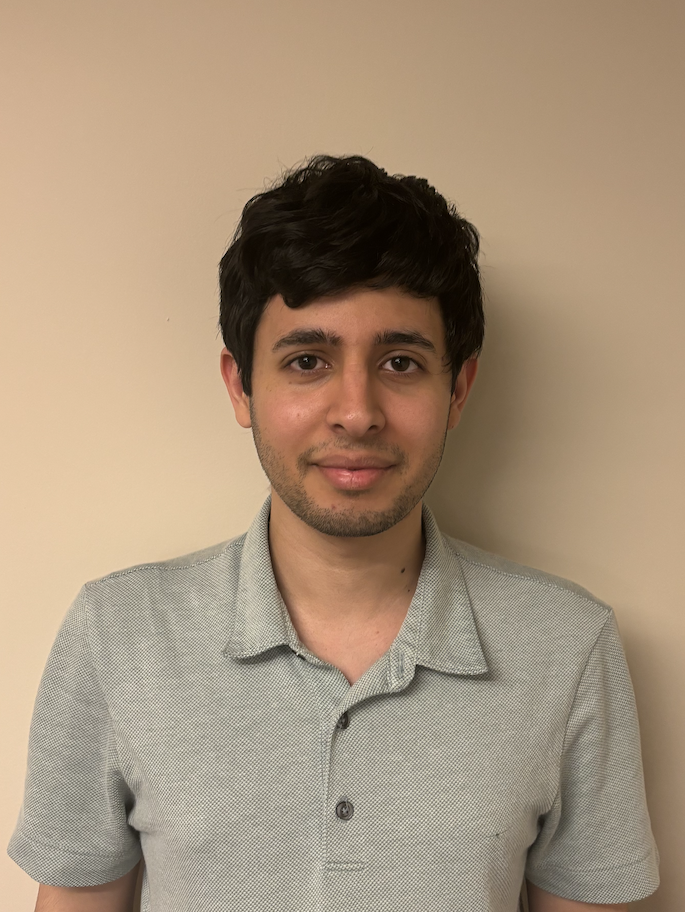
BIO
My name is Marco Garza and I am from Miami, Florida. I am passionate about human mechanisms and communicating ideas, as well as fostering, as well as fostering a learning environment. I plan to study mechanical engineering further to aid others through connecting the physical and human world.
Applications of Bayesian Analysis on Updating User Intent
Authors: Marco Garza, Dr. Taylor HigginsStudent Major: Mechanical Engineering
Mentor: Dr. Taylor Higgins
Mentor's Department: Department of Mechanical Engineering Mentor's College: University of Notre Dame (PhD, M.S) , Clemson University (B.S) Co-Presenters:
Abstract
To be beneficial, robotic lower-limb assistive robots need to able to infer what the user wants to do, this being considered the user's "intent". Previous intent recognition strategies have used external and onboard sensors on robotic devices and subjects to track force resistance and muscle activity to provide signals for the user’s intent. We believe that including information about the user’s proximity to objects, the uses of these objects to user or "affordances", and the user’s orientation should increase the accuracy of our intent recognition. Our early literature review suggested that Bayesian networks, mathematical models that use conditional probabilities to represent variable relations, can be used to improve belief of the user’s intent from including such information. Bayesian analysis is a mathematical tool that allows us to calculate how these new signals should update our belief of the user's intent. For this project, I have experimented with various designs of a Bayesian network with which to base our intent recognition algorithm. I tested these designs using a software called SamIam, which is a program that allows us to create Bayesian networks and adjust their variable sets and conditional probabilities. We determined that it is necessary to rely on discrete variables in this analysis, instead of continuous ones, to keep the computational time low. We are continuing to work to validate the utility of a particular Bayesian network design with real experimental data that includes information about the user's surroundings.
Keywords: Robotics, mathematical analysis, probability
24th annual Undergraduate Research Symposium, April 3, 2024
Alexandra Bell Poster Session 5: 4:00 pm - 5:00 pm/287
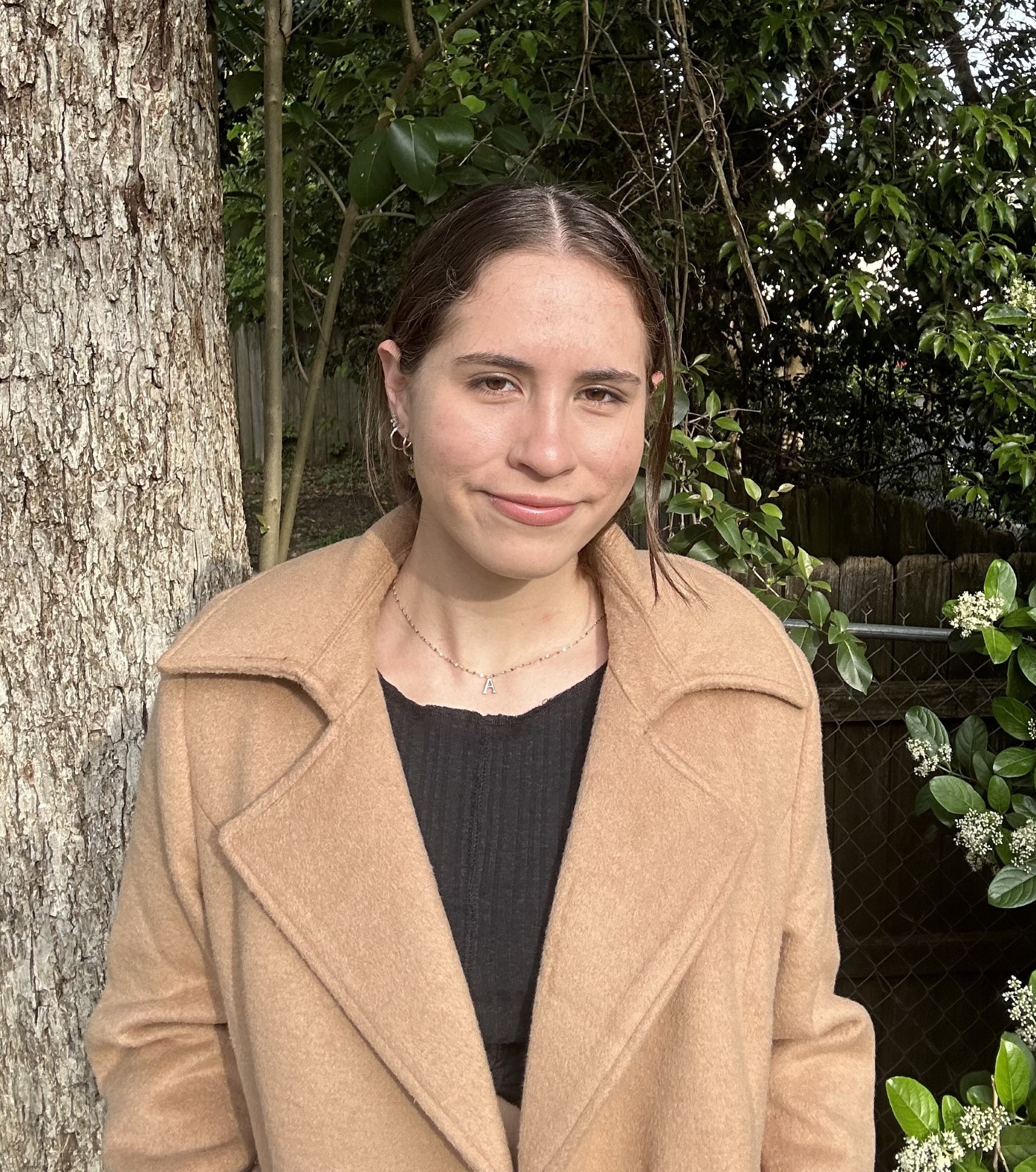
BIO
I am currently a junior transfer student from Fort Lauderdale, Florida. My research interests are very diverse ranging from topics in engineering, psychology, chemistry, and the biomedical field. I plan on attending medical school after obtaining my bachelor's here at FSU to peruse a career in anesthesiology.
Thermal Cycling of Florida Rock
Authors: Alexandra Bell, Dr. Scott WasmanStudent Major: Cell and Molecular Neuroscience
Mentor: Dr. Scott Wasman
Mentor's Department: Civil and Environmental Engineering Mentor's College: FAMU-FSU College of Engineering Co-Presenters:
Abstract
This project’s goal is to measure thermal properties of Florida limestone and soil as part of a yearlong effort to measure ground temperatures throughout seasons and diurnally. We are measuring thermal conductivity/resistivity values of samples. The findings for this study are not yet finalized as the research is still in the preliminary stages, we are still in the process of reviewing and collecting data. Once ground temperature data has been collected on an annual cycle, we will be able to use the laboratory measured data to estimate the rock and soil straining due to thermal stress. This research will be useful to better understand the influence of thermal stress on civil infrastructure, specifically seasonal and diurnal stress, and how to account for its effects in future design to improve infrastructure resilience.
Keywords: Thermodynamics, Florida Rock and Soil, Engineering
24th annual Undergraduate Research Symposium, April 3, 2024
Brooke Hagans Poster Session 4: 2:45 pm - 3:45 pm /462

BIO
As a dedicated student pursuing a major in biological sciences, I am deeply passionate about zoology and animal sciences. My academic journey has been driven by a fervent desire for knowledge and a strong commitment to contributing meaningfully to the field.
Outside of my studies, I actively engage with my community through volunteering, both on campus and in Tallahassee. These experiences have further fueled my passion for education and outreach, inspiring me to make a positive impact on the world around me.
My ultimate goal is to combine my academic knowledge with my passion for teaching and research to make a difference. I aspire to not only educate others about the wonders of the natural world but also to conduct research that advances our understanding of it.
I am excited to continue my academic exploration and to contribute to the scientific community in any way possible. My journey as a student is just the beginning, and I am eager to see where it takes me.
Optimal Excavator Efficiency on Building Demolition Sites
Authors: Brooke Hagans, Juyeong ChoiStudent Major: Biological Sciences
Mentor: Juyeong Choi
Mentor's Department: Department of Civil and Environmental Engineering Mentor's College: FAMU-FSU College of Engineering Co-Presenters:
Abstract
This project aims to enhance the efficiency of recycling materials during demolition projects, all the while considering the crucial factor of time in deconstruction efforts. The hypothesis states the employing more mini excavators in a demolition zone can enable effective material sorting based on composition within the given time constraints. This study proposes a novel approach to construction and demolition waste management, essentially streamlining the process. This methodology involved utilizing multiple mini excavators in a controlled “demolition” zone and studying footage recorded from these sessions to determine the most effective ways of sorting materials compared to conventional methods. Anticipated outcomes include insights into increased recycling rates, reduced landfill contributions, and improved sustainability in demolition practices. The findings are essential for construction companies striving to meet recycling goals while adhering to project timelines—contributing to a more environmentally conscious and sustainable construction industry.
Keywords: engineering, civil engineering, environmental engineering, construction, demolition, environment, civil, small-scale
24th annual Undergraduate Research Symposium, April 3, 2024
Ayliah Chukes Poster Session 5: 4:00 pm - 5:00 pm/377
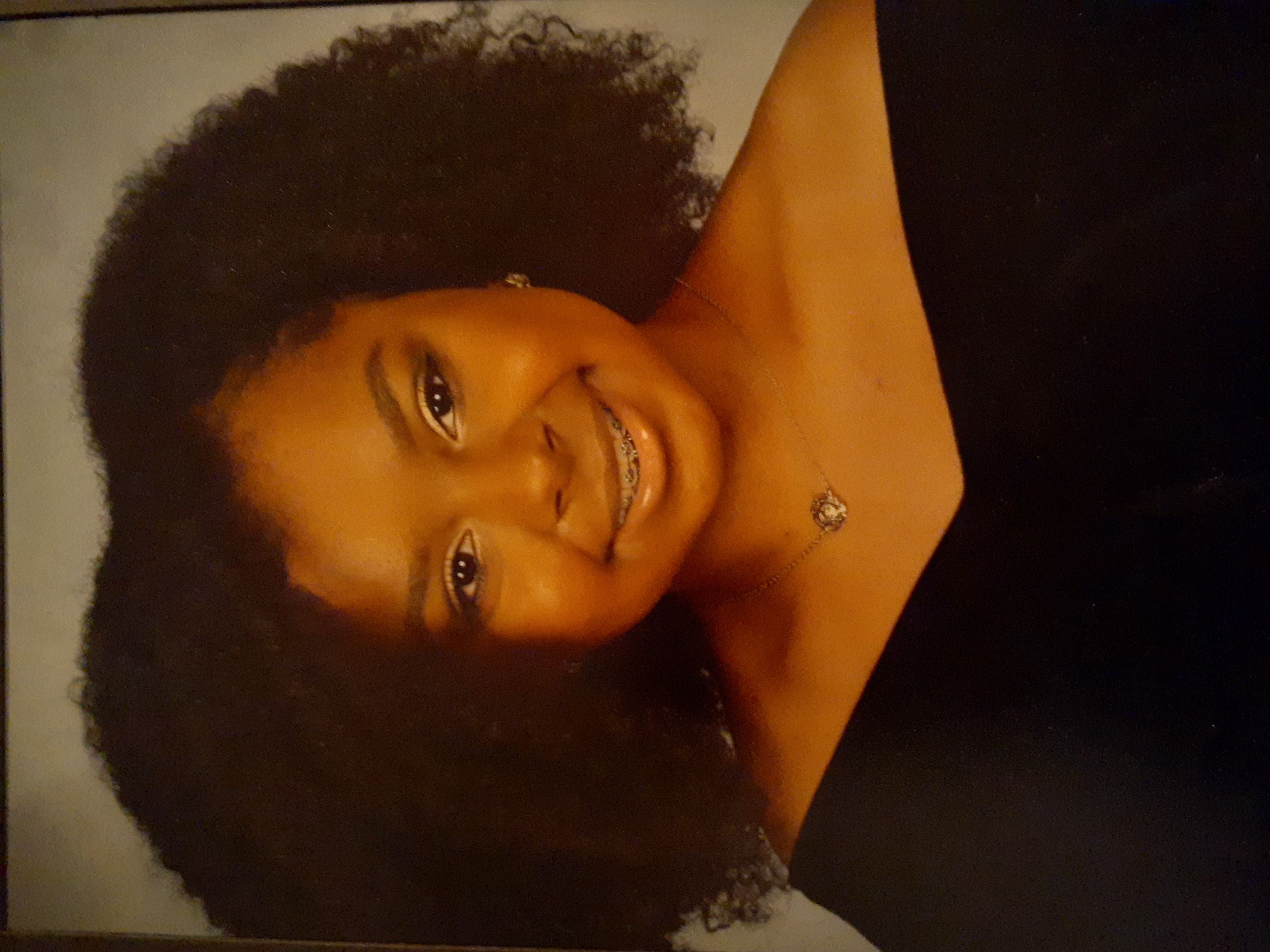
BIO
Ayliah is a dedicated second-year student pursuing a Bachelor's degree in Behavioral Neuroscience with a keen interest in exploring the dynamic topics of neuroplasticity, motor control, and cognitive neuroscience. As a Tallahassee native, she brings a strong academic foundation cultivated at Godby High School, where she distinguished herself as valedictorian. Motivated by a fascination with the brain's remarkable ability to adapt and reorganize in response to experience, she is passionate about investigating the neural mechanisms underlying learning, movement coordination, and cognitive function. Through rigorous study and research, Ayliah aspires to contribute to our understanding of these fundamental processes and their implications for human health and behavior.
Supporting The Next Generation of Scientific Thinkers: Revoicing as a tool to Support Science Talk in the Classroom
Authors: Ayliah Chukes, Sierra MorandiStudent Major: Behavioral Neuroscience
Mentor: Sierra Morandi
Mentor's Department: School of Teacher Education Mentor's College: College of Education, Health and Human Sciences Co-Presenters:
Abstract
To understand how professional development (PD) can support teachers in the pursuit of creating quality science education for students, this study aims to understand how the actions and strategies educators employ in classrooms assist students in exploring the world of science and how students engage with said strategies. In recent years, research has emphasized supporting environments where students are regarded as scientific thinkers. To accomplish this, there must be a change in the instructional beliefs and attitudes attributed to the capabilities of children to actively allow them to engage in the process of “doing science.” “Doing science” refers to studying the natural world through scientific practices, such as observation, investigation, and analysis, and is facilitated by “talking science.” Over a year-long professional development, we focus on one secondary science teacher’s shifts in supporting classroom discourse as students are positioned to engage in “doing science.” Using qualitative methodology, we explored classroom video and audio recordings to make sense of the idea of “revoicing” and how it was engaged in to support talk in the classroom. The findings of this study highlight the importance of targeted PD programs in developing a teacher's ability to facilitate learning among students by allowing students to actively “do and talk science.”
Keywords: Science talk, Science Education, Professional development, Teacher education
24th annual Undergraduate Research Symposium, April 3, 2024
Montserrat Kompatzki Poster Session 2: 10:45 am - 11:45 am/326
BIO
Montserrat is a 2nd year student from Miramar, Florida. She is currently studying Economics with the goal of pursuing a law degree. She is interested in working in the tech sector as a corporate counsel, where she hopes to work in advancing law and policy to protect personal data. Her interests are reflected in her research "Tracking Consumption: AI and Social E-Commerce", which focuses on understanding how AI manages user data collected on Social E-Commerce, to construct better informed policy.
Tracking Consumption: AI and Social E-Commerce
Authors: Montserrat Kompatzki, Steve McDowellStudent Major: Economics
Mentor: Steve McDowell
Mentor's Department: Department of Communication Mentor's College: College of Communication and Information Co-Presenters:
Abstract
This research proposes possible policy opportunities for keeping the public and companies safe from implanting Artificial Intelligence features across social e-commerce platforms. As Artificial Intelligence gains accessibility to the public, concerns arise with privacy protection for those who partake in social e-commerce; social media platforms that host e-commerce functions for its users. This project researches the concerns and opportunities posed by implementing Artificial Intelligence onto social media platforms to gather user data to create an individualized online shopping experience. It also investigates the actions taken by local and foreign governments who have established policies directed towards social e-commerce. Policy makers agree that if users of social e-commerce pages have their personal information at risk of being 'stolen' or used without permission should be prioritized to the companies who host social e-commerce and Artificial Intelligence technologies. It is proposed that any policy directed towards protecting the private information of individuals be constructed in a manner that does not inhibit the development of Artificial Intelligence technologies at such early stages of understanding the technology.
Keywords: Artificial Intelligence, Social Media, Policy, Commerce
24th annual Undergraduate Research Symposium, April 3, 2024
Lily Beeman Poster Session 3: 1:30 pm - 2:30 pm /390
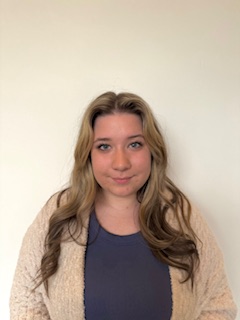
BIO
My name is Lily Beeman. I am from Clearwater, FL and this is my second year at FSU. This semester I worked with Dr. McCreary and Adam Rose on our 8 Can't Wait UROP: Police Use of ForceProject.
8 Can't Wait: A Use-of-Force Policy Analysis of Florida Police Departments
Authors: Lily Beeman, Tyler McCrearyStudent Major: Political Science
Mentor: Tyler McCreary
Mentor's Department: Geography Mentor's College: College of Social Sciences and Public Policy Co-Presenters: Natalia Romero Ramirez
Abstract
The use of force by law enforcement officers quickly became a
pressing issue of legislation and in public discussion, specifically
after the tragic deaths of civilians in police custody. As a result of
these fatal encounters and the conversations being held about this
issue, there has been increasing pressure to reform the police
department’s response to resistance. However, there has been
little systematic research to contribute to analyzing policy
discussions, making it essential for a systematic policy review to
address the safety concerns of the public. In response to these
concerns, Campaign Zero launched a proposal of eight policies
titles “8 Can’t Wait” to attempt and decrease police violence
incidents within the United States. This project aims to answer
the question “Does the presence of the “8 Can’t Wait” policies
reduce incidents of police use of force?”. To answer this, the
project conducts a systematic review of police use of force or
response to resistance policies within police departments across
the state of Florida, collected via email and public records
requests. It evaluates which jurisdictions have adopted the “8
Can’t Wait” policy proposals, along with an additional policy
mandating the provision of emergency medical services in the
case of an emergency. Concluding the systematic review, we will
analyze for possible statistical correlations between policies and
reported incidents of police use-of-force, along with any
demographic trends in the areas where policies have been
adopted.
Keywords: Police Policy Use of Force
24th annual Undergraduate Research Symposium, April 3, 2024
Yash Alva Poster Session 3: 1:30 pm - 2:30 pm/372

BIO
My name is Yash Alva, I am currently a junior Public Health major student at Florida State University and I am a part of the UROP Program.
Informatics Supporting Patients’ Understanding of Lab Results: Identifying Patients’ Questions about Lab Results
Authors: Yash Alva, Dr. Zhe HeStudent Major: Public Health
Mentor: Dr. Zhe He
Mentor's Department: Information Mentor's College: College of Communication and Information Co-Presenters: Maggie Awad
Abstract
The LabGenie project aims to address the challenge of patients, especially the elderly, in understanding medical lab test results and acting upon them. Even though generative AI models such as ChatGPT can answer questions, patients may not know what questions to ask, and they may also generate answers with inaccurate information or hallucinations. In the eHealth Lab, we are developing informatics strategies to augment large language models (LLM) by 1) identifying credible health sources for lab test result interpretation, and 2) curating these sources to computable format. As such, they can be used for question prompt enrichment with human input and retrieval-augmented generation (RAG). The ultimate goal is to integrate the RAG-based LLMs with a user-friendly interface for patients. LabGenie seeks to allow patients with low health literacy to ask contextualized questions and make informed health decisions with their providers confidently. The research involves literature reviews on LLM capabilities in clinical settings, converting lab result interpretation into a table format, and evaluating strengths and weaknesses of different LLMs in answering lab result questions. These procedures aim to provide meaningful results to train LLMs and contribute to the creation of LabGenie.
Keywords: Ai, LLMS, lab reports, lab data
24th annual Undergraduate Research Symposium, April 3, 2024
Shadman Ishmam Poster Session 1: 9:30 am - 10:30 am /229
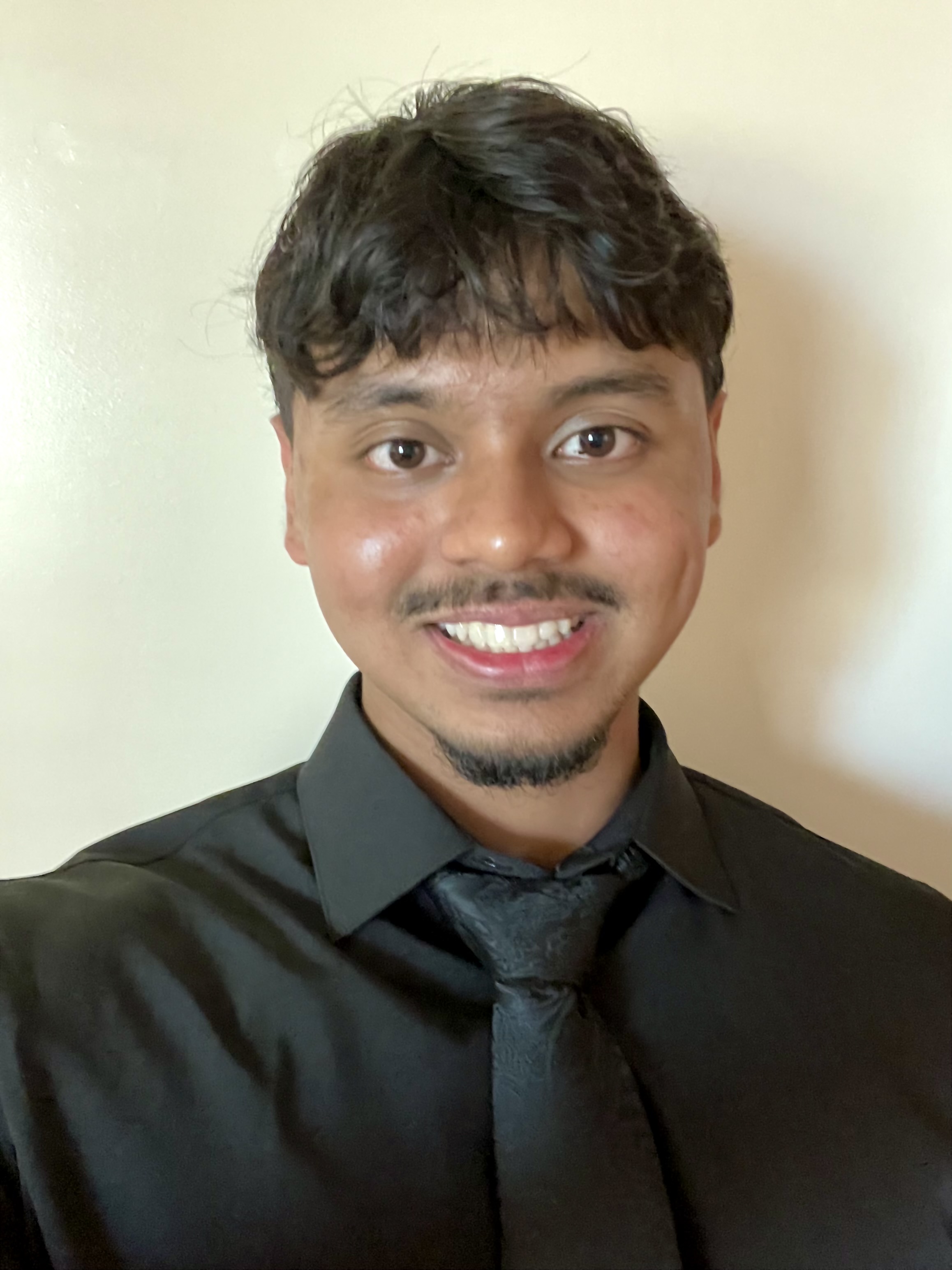
BIO
Hello, my name is Shadman Ishmam and I come from south Florida. I enjoy doing things such as working out, playing soccer, and watching shows in my free time. My interest in research comes from my desire to contribute to our ever-growing body of scientific knowledge. Although I wasn't very knowledgable at first, since joining this lab, I've learned a great deal about the microbiome and immune system of plants. Gaining such knowledge and being able to do such fascinating experiments has only further incentivized me to continue doing research in the future.
Identifying Novel Elicitors of Toxin-triggered Immunity
Authors: Shadman Ishmam, David ThomsStudent Major: Behavioral Neuroscience
Mentor: David Thoms
Mentor's Department: Biological Science Mentor's College: Arts and Sciences Co-Presenters: Olivia Ferguson
Abstract
A healthy microbiome is essential for the optimal growth and well-being of plants and animals alike. However, beneficial microbes and pathogenic bacteria are often phylogenetically alike and how a host is able to distinguish between the two is not yet understood. In plants, we understand that the pathogenic Pseudomonas fluorescens N2C3 strain induces a novel potent immune response while the beneficial Pseudomonas fluorescens WCS365 does not. Moreover, this pathogenic immune response is caused by both syringomcyin-dependent and syringomcyin-independent elicitors. To identify the syringomcyin-independent elicitors, an oxidative burst assay with Col-O and BBC triple mutant type plants was performed to measure the ROS (luminescence) response of various Ox-burst treatments via a ROS protocol. The results depict that there is a strong non-syringomycin dependent and MAMP independent immune response being induced by the pathogen suggesting that the novel compound of toxin-triggered immunity is a complex unknown molecule. Looking forward, additional replicates of this experiment will need to be conducted to substantiate these preliminary findings.
Keywords: plant, immunity, microbiology, toxin, microbiome
24th annual Undergraduate Research Symposium, April 3, 2024
Jasmin Perez-Ventura Poster Session 3: 1:30 pm - 2:30 pm /425

BIO
Hello! My name is Jasmin Perez-Ventura. I am a second year student from Tampa, Florida. I have enjoyed research since high school, but I didn't fully indulge in it until this year. I had the pleasure of working with Dr. Amanda Tazaz who is a Senior Research Associate at the Learning Systems Institute here at Florida State. I hope to continue doing research next year with what I learned from UROP.
The Effect of Unsanitary Drinking Water from Groundwater and a Public Water Supply
Authors: Jasmin Perez-Ventura, Dr. Amanda TazazStudent Major: Public Health & Media Communication Studies
Mentor: Dr. Amanda Tazaz
Mentor's Department: Learning Systems Institute Mentor's College: Learning Systems Institute Co-Presenters:
Abstract
Groundwater is essential for life because it not only provides drinking water for millions of people but it benefits our environment by providing irrigation for crops and agricultural production and helps provide freshwater to support ecosystems. Groundwater is the water that fills the spaces between the rocks and soil underground and can be extracted through many places, like artesian wells, artificial wells, springs, and aquifers. Having access to clean sources of groundwater is important as many people rely on groundwater as their primary source of water. Contamination of groundwater is becoming very common and not only effects people's health but it can cause negative impacts on the environment including the poisoning of wildlife, reduction in crop yields. I am adapting an activity to engage high school students on exploring the properties and characteristics of local water sources, such as tap water, river water, and lake water using simple tools and methods. This activity will help students learn about groundwater and discover the possible sources and effects of contamination.
Keywords: public health, groundwater, contamination
24th annual Undergraduate Research Symposium, April 3, 2024
Sofia Nuonno Poster Session 3: 1:30 pm - 2:30 pm /261
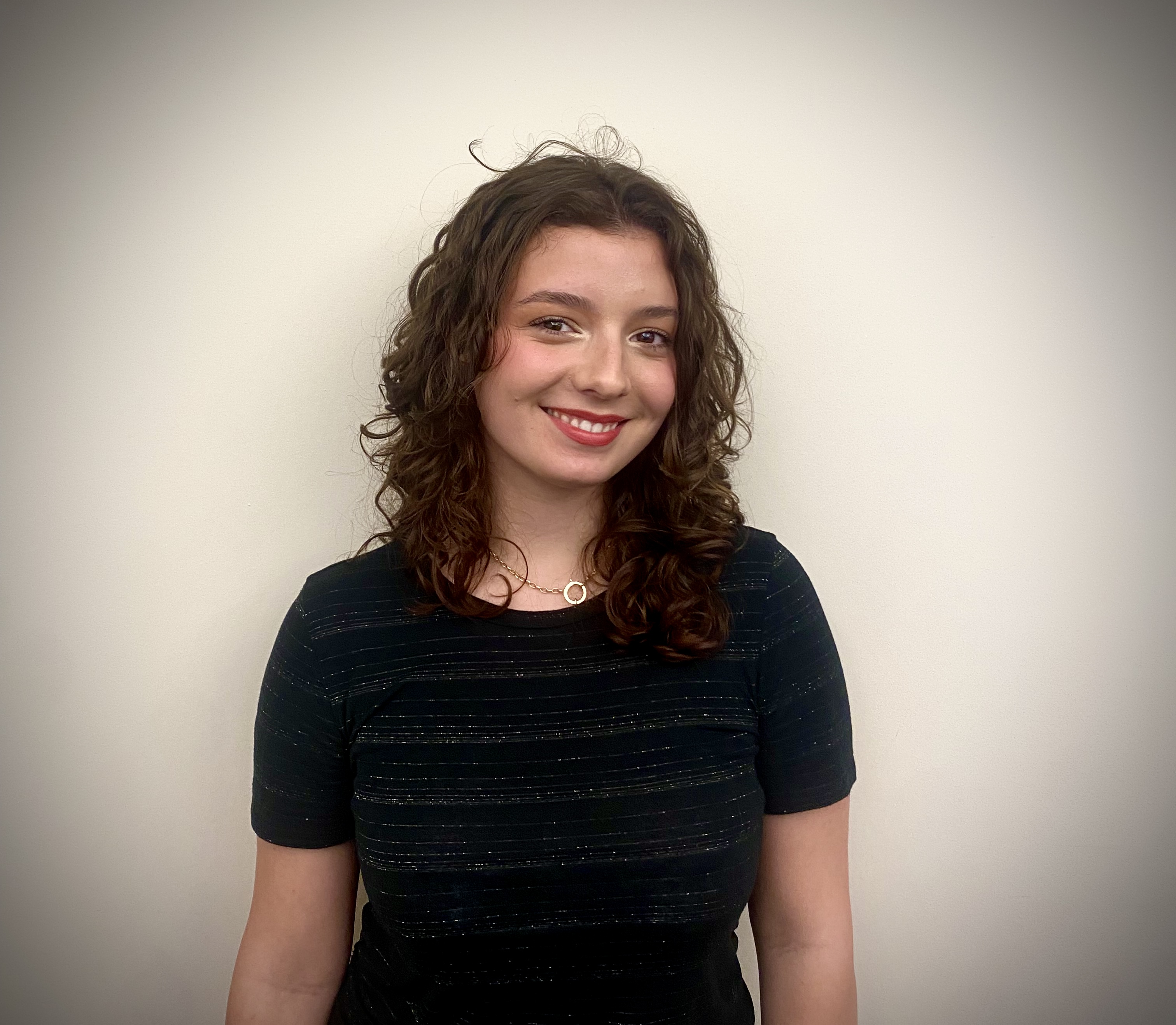
BIO
Sofia is a Sophomore student at FSU interested in pursuing a career as a university professor. She was born in Pisa, an Italian town, and moved to Miami at the age of ten. Throughout her childhood, she always expressed an interest for the arts — more specifically, painting and writing — which drove her to dedicate her academic career to these fields. Because of this, her research interests focus on the humanities, as creativity and self-expression have always been her main priorities within academia.
"Dante Today": How Dantean Literature Influenced Visual Arts
Authors: Sofia Nuonno, Dr. Elizabeth CoggeshallStudent Major: Art History; Literature, Media, and Culture
Mentor: Dr. Elizabeth Coggeshall
Mentor's Department: Department of Modern Languages and Linguistics Mentor's College: Stanford University Co-Presenters:
Abstract
Archaic literature has always been the source of great intimidation for students. This is why the "Dante Today" project aims to serve as a didactic tool for teachers and students all over the world by presenting contemporary representations of Dante's works in different media forms, such as film, art, and literature. This forum accepts submissions from anyone able to scavenge remnants of Dantean traces and their influence on popular culture, which allows for the universalization of Dante's poetry. Dante Alighieri (1265-1321), as an esteemed Florentine poet from the Middle Ages, is often credited with having written one of the most important poems of all time: "The Divine Comedy". This literary work is also thought to be the foundation of contemporary Italian language, which led scholars to label Dante as "sommo poeta" (supreme poet). Because of this, his works have often been gatekept and strictly associated solely with Italian culture. "Dante Today" aims to detach the poet from this biased perspective by universalizing his work and reporting its multicultural interpretations.
Therefore, the "Dante Today" project has been a crucial tool for the flourishment of Dantean analysis on behalf of students and teachers, which has shed light on the great impacts that Dante has had on contemporary culture. Since the majority of the articles published on the "Dante Today" website cover music, visual arts, film, and literary elements, an investigation was led to further analyze Dante Alighieri's impact on the history of art, which has revealed a creative preference for "Inferno".
Keywords: Dante, Medieval Literature, Visual Arts
24th annual Undergraduate Research Symposium, April 3, 2024
Surya Hemraj Poster Session 3: 1:30 pm - 2:30 pm/198

BIO
I'm Surya Hemraj, a second-year undergraduate student at FSU. My academic journey is underscored by a commitment to becoming a physician, fueled by my love for people and life. Additionally, I aspire to integrate my profound interest in health equity into my future career. Eager to contribute to the improvement of healthcare accessibility and outcomes, I am actively leveraging my interdisciplinary education and diverse experiences to make a meaningful impact in the field of medicine. My current research project provides underrepresented students with free STEM enrichment opportunities, aligning with my goal to increase diversity and equity in healthcare and STEM fields.
Bridging the Barrier Between Underrepresented Tallahassee Students and STEM Enrichment Opportunities
Authors: Surya Hemraj, Malathy ElumalaiStudent Major: Health Managment, Policy, and Information.
Mentor: Malathy Elumalai
Mentor's Department: National High Magnetic Field Laboratory Mentor's College: National High Magnetic Field Laboratory Co-Presenters: Tristny Ta
Abstract
The southside of Tallahassee, characterized by Title 1 schools and limited community resources, is an underrepresented area where motivating students to engage with STEM content in elementary and middle grades is crucial. Research indicates that eighth-grade students interested in STEM are up to three times more likely to pursue STEM degrees later in life than those who are not interested (PCAST 2010, p. 19). However, some interested students lack the funds to participate in STEM programs. After-school programs offering STEM learning are costlier, with parents reporting a mean cost of $107 per week compared to $74 for programs without STEM (TAA, 2020). To address these barriers and increase diversity in STEM fields, we initiated the Neighborhood STEM Fairs in collaboration with the National High Magnetic Field Laboratory.
The fairs provide K-12 students with exposure to free or affordable STEM summer programs, aiming to increase their participation. We organize two annual fairs: the Neighborhood Camp Fair for K-8 students and the Neighborhood Internship Fair for 6-12 students. Our research focuses on increasing fair attendance by expanding camp participation and enhancing marketing strategies to reach students and parents effectively.
This project aims to strengthen the connection between the southside community and STEM programs, breaking the barrier of socioeconomic status.
Keywords: STEM, underrepresented, students
24th annual Undergraduate Research Symposium, April 3, 2024
Christina Dugazon Poster Session 3: 1:30 pm - 2:30 pm/39
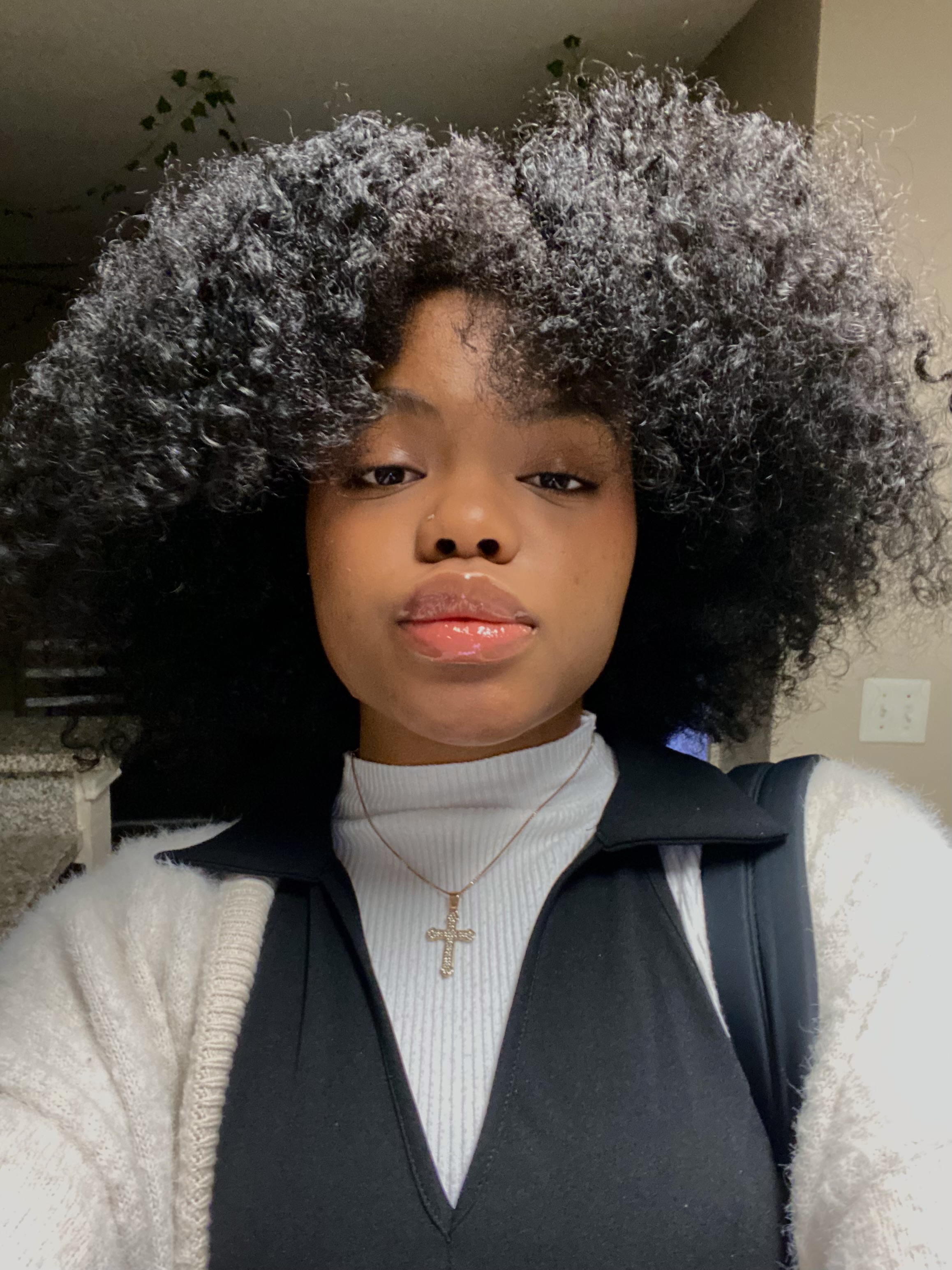
BIO
A student who is always learning, having more than one interest & specialties, but it always comes back to loving the world and eager to learn more about humans who have lived and are still living. Studying Anthropology at Florida State University with a focus on the subfield of culture.
#CapeBreak: The Reverse Engineering of the Strong Black Woman Phenomena.
Authors: Christina Dugazon, Dr.Chris OmniStudent Major: Anthropology
Mentor: Dr.Chris Omni
Mentor's Department: Soc Sci Health Policy Research Mentor's College: Florida State University Co-Presenters: Nailah Lee, Christina Dugazon
Abstract
The #CapeBreak Project offers a diverse perspective from four resilient Black women between the ages of 34 and 58. The initiative seeks to challenge the stereotype of being the “Strong Black Woman” who is burdened with the expectation to be mentally and physically strong for everyone around them. Through art-based research, we explored intergenerational dynamics, the psychological influence of nature, and the emotional well-being of Black women.
The #CapeBreak study will conclude with a live ethnographic performance, conference/festival presentations, panel discussions, and journal publications. We aim to reach a broader audience by highlighting the importance of Black joy globally and supporting Black women who feel constrained by being the “Strong Black Woman."
Keywords: black women, strong, nature, art-based research
24th annual Undergraduate Research Symposium, April 3, 2024
Isha Shah Poster Session 5: 4:00 pm - 5:00 pm/365
BIO
Isha Shah is a second year cell and molecular neuroscience major who studies behaviors and motivation regarding feeding in mice with this research she hopes to pursue medical school
Oxytocin Signaling in Ventromedial Hypothalamus Regulates Eating Behaviors
Authors: Isha Shah, Xiaobing ZhangStudent Major: Cell and Molecular Neuroscience
Mentor: Xiaobing Zhang
Mentor's Department: Psychology Mentor's College: College of Arts and Sciences Co-Presenters:
Abstract
Our main goal of this experiment is to examine oxytocin receptors (OXTR) in the ventromedial hypothalamus (VMH) and how they regulate eating behaviors. This region in the brain is largely responsible for regulating emotion, eating behaviors and sexual behaviors (Khodai, Tansi, Luckman 2021). OXTR-expressing neurons play a major role in eating behaviors and emotion and have been shown to be expressed in the VMH (Florea et al.,2022). However knowledge of OXTR-expressing neurons in the VMH and how they regulate eating behaviors is largely unknown. In efforts to provide better understanding of neuron function, seven male OXTR-Cre mice were used in this experiment. Initially, the mice underwent operant conditioning tests to see how the OXTR-expressing neurons in the VMH could affect motivation. However, we found that activation of the OXTR-expressing neurons in the VMH had no impact on motivation. Food intake was tested to see if neuron activation would have an effect on eating behaviors in various energy states. When the mice were tested with ad libitum normal chow, and fasted normal chow no effect was shown. Conversely, neuron activation caused a decrease in intake of highly palatable food. Based on our findings, OXTR neurons in the VMH may regulate the intake of highly palatable food.
Keywords: Neuroscience, psychology, cognitive neuroscience
24th annual Undergraduate Research Symposium, April 3, 2024
Chloe Dennis Poster Session 3: 1:30 pm - 2:30 pm /225
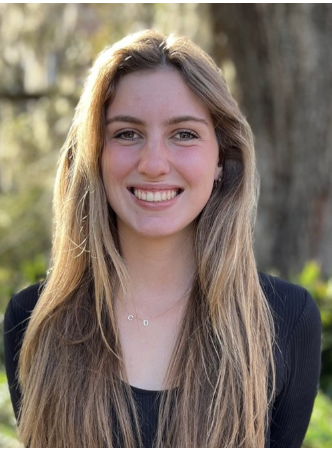
BIO
Chloe is a second-year student double majoring in public health and psychology with a concentration in neuroscience. She currently conducts research in the Silvers lab, mentored by Victoria Ogunkunle. Outside of research, Chloe works as a learning assistant and is involved with Research Development at FSU. In her free time, Chloe enjoys playing tennis.
Differential Scanning Fluorimetry: A High-Throughput Screening Method for Monitoring RNA Stability
Authors: Chloe Dennis, Victoria OgunkunleStudent Major: Public Health, Psychology
Mentor: Victoria Ogunkunle
Mentor's Department: Department of Chemistry and Bio Chemistry | Institute of Molecular Biophysics Mentor's College: College of Arts and Sciences Co-Presenters:
Abstract
Functional RNAs are characterized by 3-D structure and ligand binding. The riboswitches Neomycin and PreQ1 are well-characterized molecules with clear structured transitions induced by ligand binding. These molecules can serve as a model system for developing tools to monitor structural transitions in RNA folds. We have developed a system that uses intercalating dyes to monitor structural transitions by differential scanning fluorimetry. Within data, we are able to identify clear structural shifts for the ligand-bound and unbound states of both the Neomycin and PreQ1 riboswitches. We anticipate this approach will be widely applicable to other functional RNAs such as riboswitches. These results are pertinent in this field and others because functional RNAs are critical regulators of gene expression.
Keywords: Biophysics, Biochemistry, RNA, Riboswitch, Differential Scanning Fluorimetry
24th annual Undergraduate Research Symposium, April 3, 2024
Aiden Hutt Poster Session 2: 10:45 am - 11:45 am/392
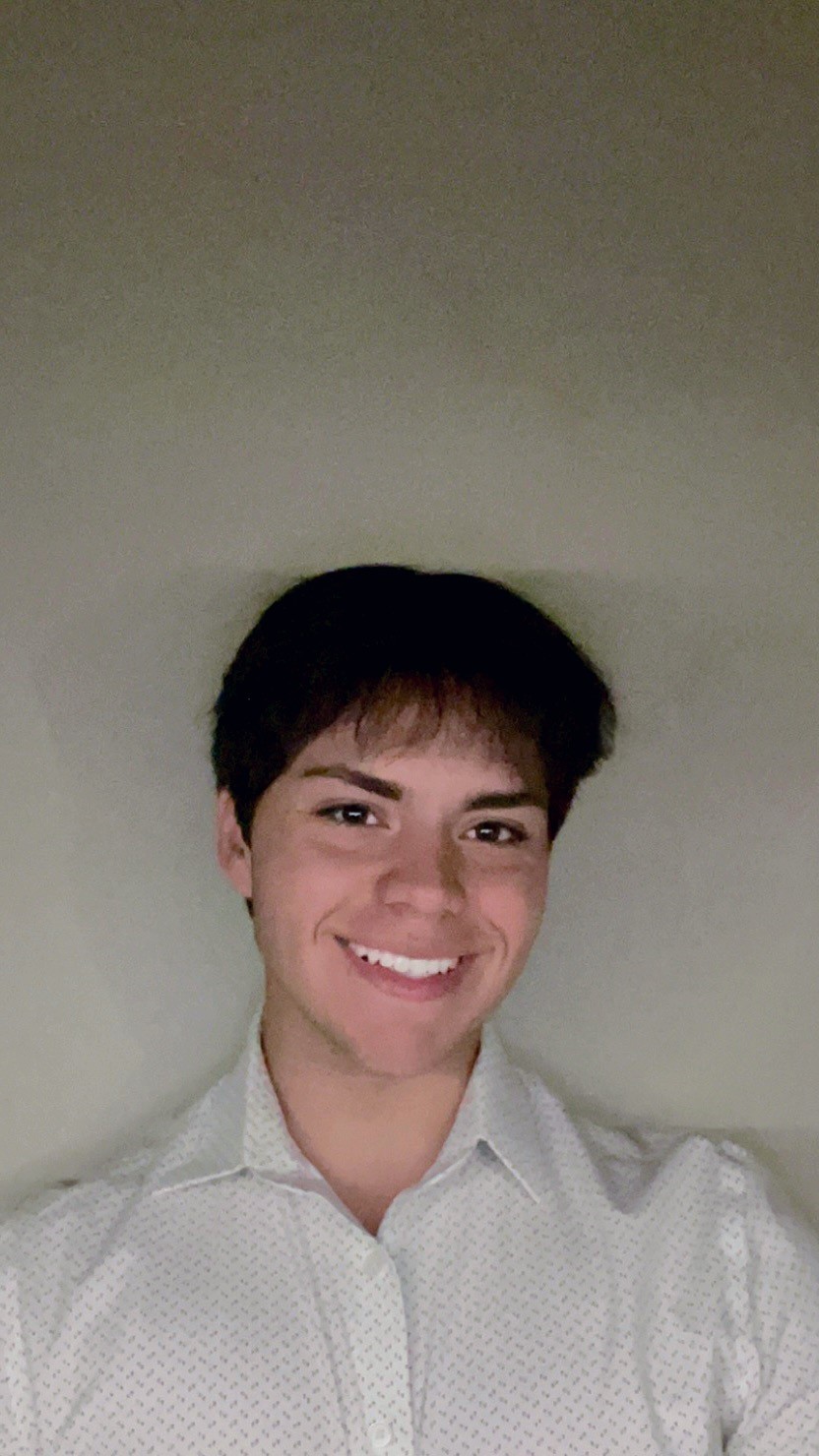
BIO
Hello! I'm Aiden Hutt, a passionate biology major at Florida State University with a focus on zoology. I am currently conducting a self-directed experiment at the Coastal and Marine Laboratory to better understand how nutrient elevation, which is often caused by environmental pollution, affects the growth of Warty Sea Anemones from Caspersen Beach, FL. My interest in coral conservation research stems from a strong desire to positively contribute to the community dedicated to protecting our oceans. Throughout my undergraduate studies, I found research to be extremely rewarding, and I am excited to continue exploring and contributing to this field.
Impact of Nutrient Enrichment on Warty Sea Anemones’ Growth Dynamics: A Coastal Ecosystem Perspective
Authors: Aiden Hutt, Dr. Tara Stewart MerrillStudent Major: Biology
Mentor: Dr. Tara Stewart Merrill
Mentor's Department: Coastal and Marine Laboratory Mentor's College: Office of Research Co-Presenters:
Abstract
This study aims to investigate how nutrient elevation (such as that driven by nutrient pollution) affects the growth of Warty Sea Anemones from Caspersen Beach, FL. It has been proposed that anemone reproduction and population growth is aided by excess nutrients from human runoff, which fosters bacterial blooms. By evaluating anemone health and reproduction across experimentally manipulated nutrient levels, my study seeks to understand the effects of nutrients on important taxa from coastal ecosystems. These results may have broad relevance for marine conservation and restoration efforts.
Keywords: Coral, Pollution, Anemone, Runoff
24th annual Undergraduate Research Symposium, April 3, 2024
David Ermakov-Speo Poster Session 4: 2:45 pm - 3:45 pm /274
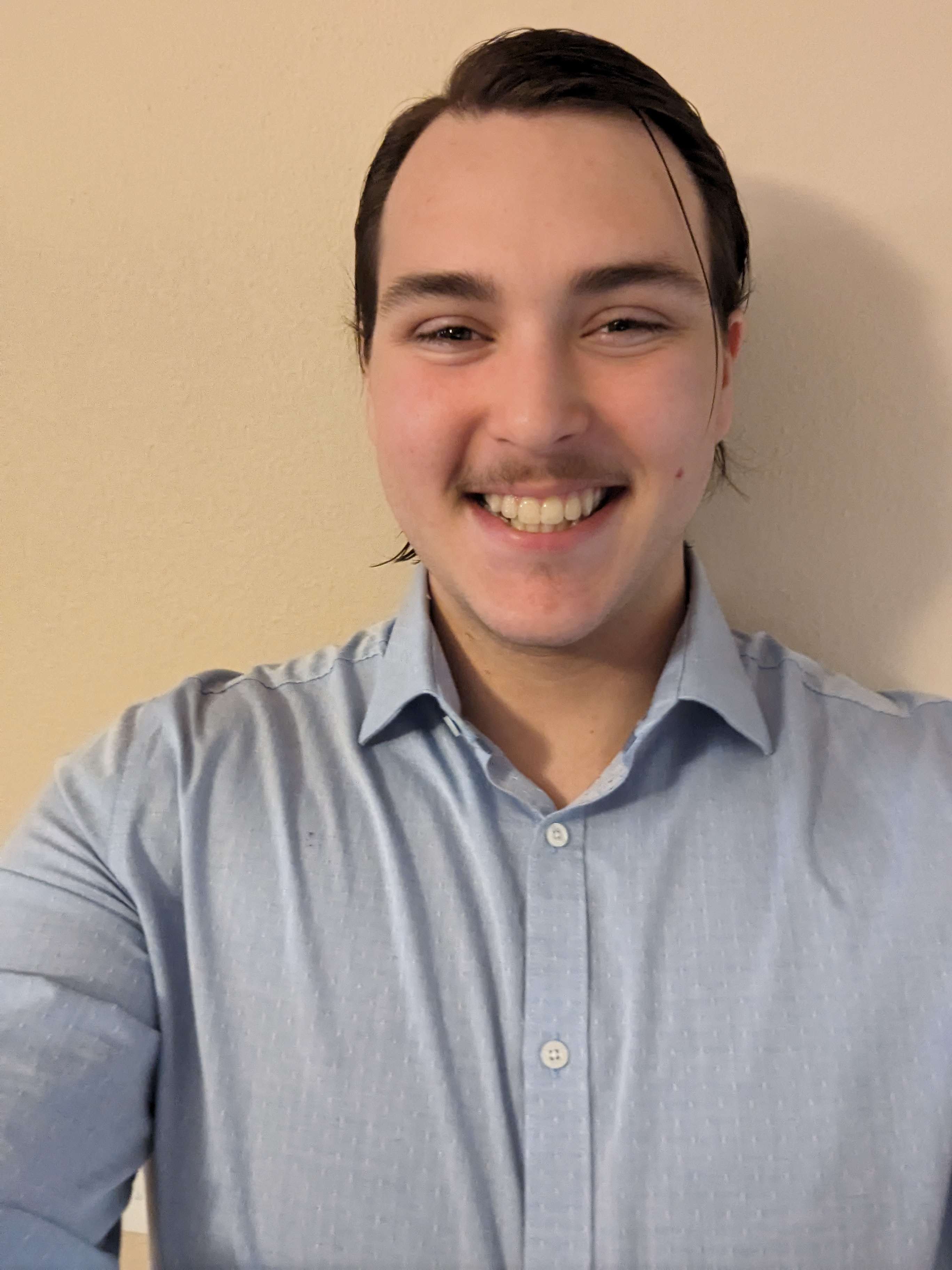
BIO
My name is David Ermakov-Spektor! I was born and raised in Miami, and I am a sophomore Biomedical Engineering student studying cell & tissue bioprocesses- egged on by how I myself have type 1 diabetes, love chemistry, and love biology; In Fall 2023, I found a great interest in alternative, sustainable fuels, and as someone that cares greatly for sustainability I wanted to understand what we can do to efficiently as a collective society to switch off using oil and gas.
As of lately my hobbies have been designing and learning about little bits of programming, baking, running, watching movies, video games, and sketching different engineering schematics for fun!
Developments in Hydrogen-Fueled Engines for Automobiles and Aircraft
Authors: David Ermakov-Speo, Sastry PamidiStudent Major: Biomedical Engineering
Mentor: Sastry Pamidi
Mentor's Department: Center of Advanced Power Systems (CAPS) Mentor's College: College of Engineering Co-Presenters:
Abstract
Green Hydrogen or zero-emission hydrogen fuel-based technologies within the past 7 years have found important infrastructure built up. There are delivery trucks and 18-wheel trucks transitioning to running on hydrogen fuel cells. This is in addition to the latest development of green hydrogen powered aircraft & engines. This research is to analyze the development of these green hydrogen fueled engines and their developments in design and changes in infrastructure within the engines of these vehicles.
Keywords: Hydrogen fueled engines

